







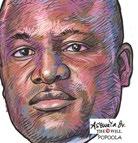





















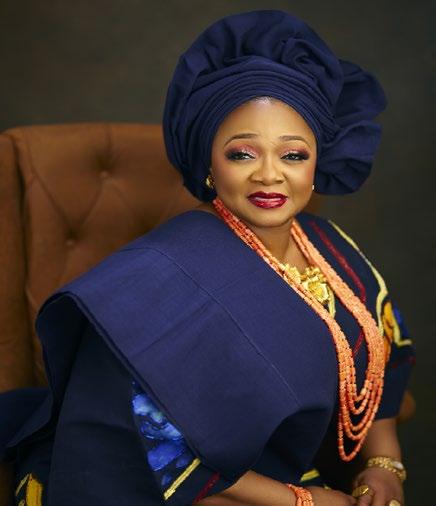



Nigerian women have broken barriers and changed the narrative that leadership and politics are exclusive to men. In many political and public service positions today, more women are achieving success and taking the lead. Outside the titles, these women are proving to the world that they are capable, dedicated, and full of purpose. They push through challenges and lead with strength, passion, and a deep sense of responsibility. One such woman is Honourable Imaan Sulaiman-Ibrahim. She is a strong voice in the political space who leads with purpose and impact. Hon. Sulaiman-Ibrahim has served in different leadership roles, including her time as the Director-General of the National Agency for the Prohibition of Trafficking in Persons (NAPTIP) and Federal Commissioner of the National Commission for Refugees, Migrants and Internally Displaced Persons (NCFRMI). Today, she is the Honourable Minister of Women Affairs, where she champions women’s and children’s rights across Nigeria.
Read her interview on pages 8 through 10.
Many people think a brooch is outdated, but it is a classic fashion accessory that can wake up an ensemble. In our fashion pages, we show you how you can wear a brooch to make it stylish. That’s on pages 4 and 5.
Skin allergies are pretty common and may result in itching, swelling, rashes or blisters. They can be either mild, in which case a temporary reaction, or in some cases severe, which could lead to a long-lasting reaction. This week’s beauty page explores common skin allergies and how they affect the skin. Scroll to page 12 for this.
As we celebrate the resurrection of Jesus Christ, let us remember to give to the poor at this time. Happy Easter to our dearest readers.
Until next week, enjoy your read.









SUNDAY, APRIL 20, 2025
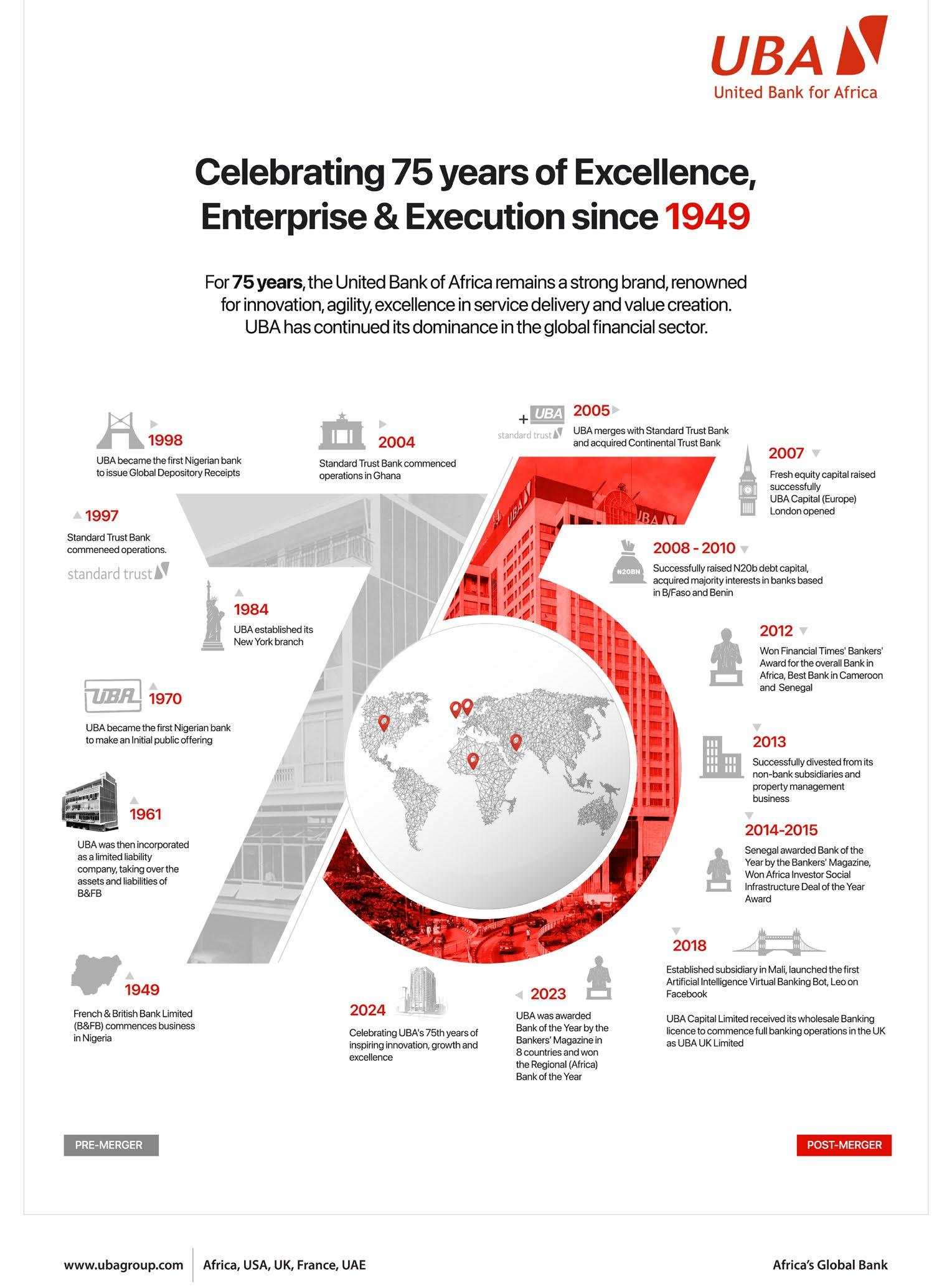

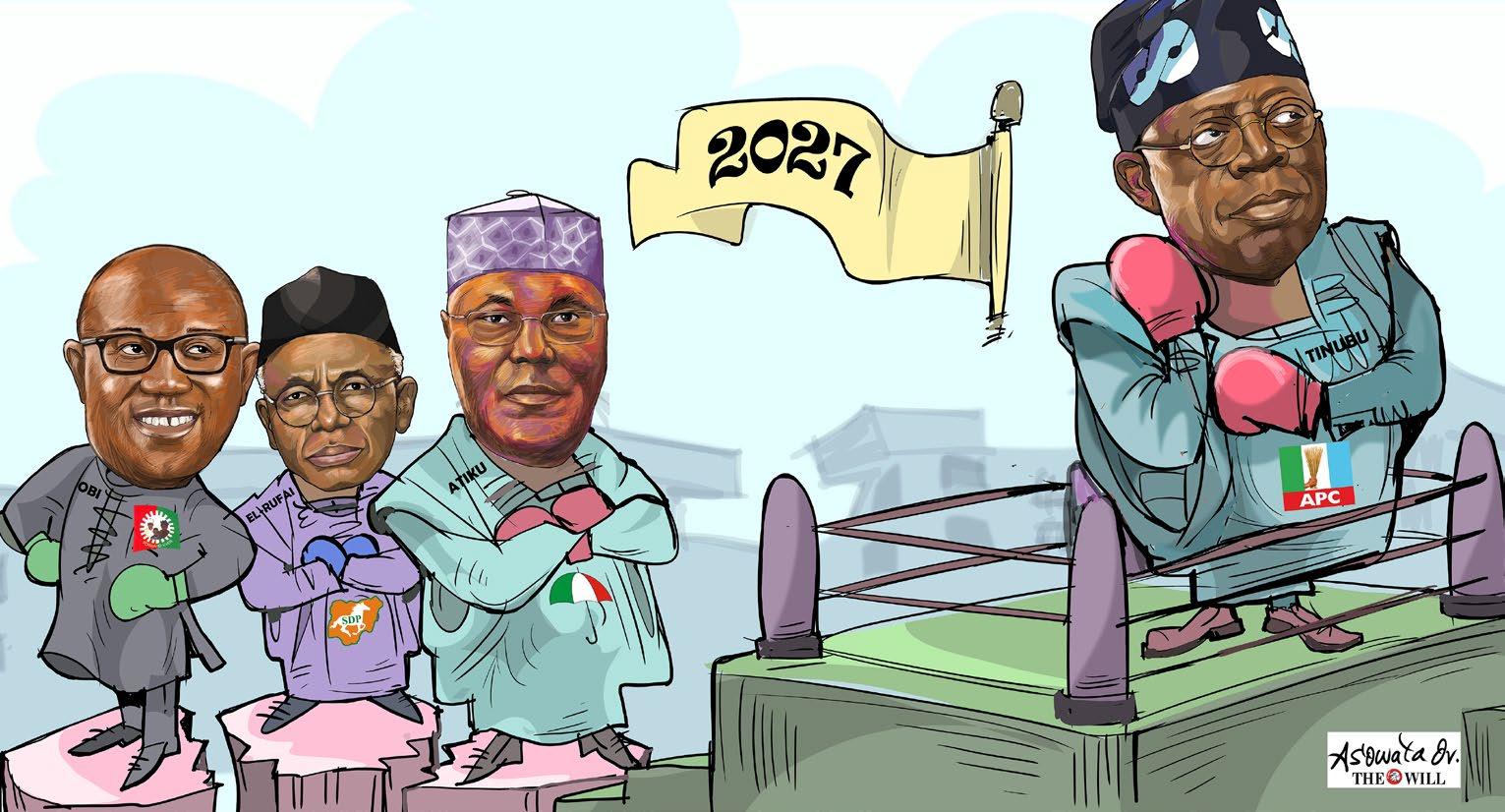
BY AMOS ESELE
The 2027 General Election is roughly two years away, but it is currently the talk of the town, struggling for headlines with immediate issues of insecurity and senseless killings in some communities in the country, especially in Benue, Borno and Plateau States.
THEWILL investigations show that while former Vice President Atiku Abubakar of the Peoples Democratic Party, PDP, former Governor Nasir el-Rufai of Kaduna State and the Presidential candidate of the Labour Party in the 2023 general election, Peter Obi, are capitalising on the economic downturn in the country to drive the coalition talks ahead of the 2027 general election, the governing All Progressives Congress, APC, is battling within to hold together the legacy political parties that gave birth to it.
Moreover, the coalition talks leaders are facing a stumbling block in their attempts to forge alliances across major opposition political parties because of the ongoing crisis in virtually all of them.
The PDP and LP are currently re-adjusting to the internal crisis generated by the fight over the position of National Secretary and National Working Committee leadership, following separate Supreme Court rulings that restated the supremacy of political parties over the management of their affairs.
For the APC, the perceived lopsided federal appointments has polarised the party into Action Congress of Nigeria faction loyal to President Bola Tinubu and the Congress for Progressive Change, CPC, loyal to ex-President Muhammadu Buhari.
“When you have a situation where people cannot eat well, the number of out of school children is increasing rapidly and poverty has increased, leaders have to talk among themselves about how to salvage the situation.”
Tanko Yinusa, Coordinator of the Obidient Movement and presidential spokesperson for the Labour Party in the 2023 general poll told THEWILL on Friday.
Interestingly, the International Monetary Fund, IMF on Friday made some critical observations about the country’s economic and social challenges that gave some bite to the views of the opposition.
In its 2025 Article IV Consultation report based on meetings held by its representative with government officials, heads of Ministries, Departments and Agencies, the Fund praised the Nigerian Government for embarking on reforms that have positioned the country to withstand external economic shocks, but raised an alarm over increasing poverty in the country.
The Fund’s team led by its Nigerian official, Axel Shimmelpfening, lamented that praise- worthy as measures like the “discontinuation of central bank financing for fiscal deficits, the elimination of expensive fuel subsidies and enhancements in the operation of the foreign exchange market were,” poverty is yet to abate among the generality of Nigerians.
The “gains have yet to benefit all Nigerians, as poverty and food insecurity remain high,” Shimmelpfening said while emphasising the need to “ensure that savings from the removal of fuel subsidies are fully integrated into the national budget and used to protect vital, growth-
stimulating investments and to expand the delivery of cash transfers, especially under the World Banksupported programme targeting those suffering from food insecurity.”
Prevailing harsh economic and social conditions in the country, due to government policies, are at the background of the impending political coalition ahead of 2027, Yinubu maintains.
“How do we salvage the situation is a question that leaders of political parties are coming together to ask now so that they can provide the answers,” he said. But he is quick to add that this quest is being done on an individual basis and not as political parties. “As far as I know, the major political parties, without exception, are in crisis.”
Former Vice President of Nigeria, Atiku Abubakar’s Media Adviser, Paul Ibe, is confident that the emergent coalition ahead of 2027 polls is so huge and formidable that Nigerians would marvel at its public presentation, which is soon.
“The coalition is a Nigerian project, not an Atiku, Obi or el-rufai project. These leaders are just the guiding light of the project to achieve the objective. Nigerians in their numbers who are everyday finding it unacceptable what they are faced with; the government is not working for them. The coalition therefore presents Nigerians with a vehicle.”
However, Minister of the Federal Capital Territory, Nyesom Wike, and a leader of the major opposition PDP, said the talks of coalition or opposition on an individual





or party basis for the purpose of challenging President Tinubu’s re-election, is dead on arrival.
At a media parley on Friday, he said for the President to have triumphed over the pre-election antics of his own party and won the 2023 election shows that he was destined to win and would win again in 2027. The PDP, Wike noted, lacks the structure to win just as he kicked against any zoning of the presidential ticket to the North.
“I have said it in 2023 and I’m saying it again that until 2031, when the position should go to the North, there is nothing anybody will say to me now. It’s not anti-party, it’s harmonious living together, you can’t tell me that it’s your own prerogative to be producing president; let’s all live,” he said.
Former Governor Ayo Fayose of Ekiti State said the coalition will go up in smoke very soon because the governors of the PDP are not with Atiku, as they are fighting for their own political survival.
At the weekend, he said that, “If anybody is fighting issues with his party, he can resolve that with his party. The (PDP) governors’ actions and statement in Ibadan is to tell Atiku that we are not with you, we are going nowhere, we have our own identity.
“So, that coalition is just in the imagination of people trying to bring it to fruition. So, let me say to you, it’s a waste of time.”
UNCERTAINTIES IN THE PARTIES AS OBSTACLES
An insider with deep knowledge of the inner workings of the main opposition PDP confided in THEWILL that while leaders in their personal capacities are discussing coalition ahead of the 2027 polls, the major political parties themselves are in varying degrees of crisis that creates an uncertainty in the air and threatens the polity.
“Nobody knows where the road is leading and will end in the entire polity. My fear is that we do not all end up in strife. Take the governing APC. It is the government that gives a face to the governing party. Otherwise, how come the legacy parties that merged to form it are still waxing stronger?.
He alluded to the leadership crisis in two of the major legacy parties within APC, the Action Congress of Nigeria, ACN, of the President and the ex-President Muhammadu Buhari’s Congress for Progressive Change, CPC, which have in turn monopolised governmental appointments.
“They are fighting. A day after former Governor Umaru Tanko Al-Makura of Nasarawa and his former Katsina counterpart, Aminu Masari and 21 leaders of the CPC recently signed a statement on its behalf supporting President Tinubu’s re-election, another leader of the CPC and former Attorney- General of the Federation and Minister of Justice, Abubakar Malami, blasted them, arguing that they lacked the right to speak for the CPC membership, as he himself was currently consulting about his political future.
The PDP faction that joined the APC, like former Senate President Bukola Saraki, former Sokoto Governor and now Senator, Aminu Tambuwal, have since retraced their steps to the PDP. Former Minister of Transportation, Rotimi Ameachi is not a committed APC man. New entrants into APC like Senate President Godswill Akpabio, Minister of Works, Dave Umahi and to an extent, Wike, are the ones making waves in APC. In my party PDP, some leaders are one leg in the party, another in the APC or in the brewing coalition. These are the shifting alliances that creates uncertainty in the polity and until they are settled, we cannot define the political firmament yet ahead of 2027.”
Disagreements over what to do in the prevailing circumstance and how is still going on. In the PDP, for instance, while Governor Seyi Makinde of Oyo State who recently oversaw the successful conduct of the South-West zonal elective congress of the party and hosted PDP Governors Forum in Ibadan, where the party overruled any interest in coalition talks, fixed its national convention for August 29, said it is timely to start the discussion of 2027 politics now, his counterpart in Akwa Ibom State, Eno Umo, has voted to support Tinubu for a second term.
there (presidential villa) and tell Baba, “we will support you,” in the afternoon, they do another thing.”
Open signs of a major crack in the CPC, came up last when ex-AGF, Malami rebuked former Nasarawa governor, Al-Makuri and his Katsina counterpart, Masari, for speaking on behalf of the party that it would support Tinubu’s second term bid. He said he would further explain his pro-Tinubu stand in the future.

Makinde said that now is the time to start preparation for the 2027 general election in the country.
In the newsletter made available to this newspaper at the weekend, Governor Makinde, among other things, said, “Yes, it is still two years before the next presidential election, but now is the best time to begin to prepare for the journey ahead. The last two years have been difficult for Nigerians as a whole.
According to him, decisions have been made – some illtimed, others ill-conceived and “they have inadvertently brought us to where we are today as a nation. It is time to reset.”
He urged those he referred to as forward-thinking Nigerians to begin to seek out the best alternative, one that will restore peoples collective trust in democracy and once again place our nation on the path to prosperity.
“Nigerians have tested the APC experiment. After 10 years, it is clear which political party has the temperament to foster economic growth and development. Nigerians must now decide whether the so-called ‘corruption’ that was said to be killing Nigeria under the PDP has truly died or whether it has instead been fertilised and reborn, “ he said, adding, “If there has ever been a time in our nation’s history when it is critical to take an interest in our political future, it is now. It is time for a shift.”
Makinde’s stand confirms this newspaper’s findings that he is eyeing the presidential candidacy of his party alongside his Bauchi counterpart, Mohammed. “That is part of the game, either of them is eyeing the presidency. What we are yet to know is whether either of them will aspire for the Presidential or Vice Presidential ticket,“ a party source confided in THEWILL
Governor Umo at the weekend expressed a different view. Disclosing that people have been calling him to explain his recent statement that he would support Tinubu’s second term bid, he said, “Me, I do not know how to speak from two sides of the mouth. In the night, they go
“ The structure is in place. There will be alignment and realignment and when the train gets off, those still undecided now will be forced to jump on the wagon
Who is speaking for the CPC in the 2027 general election? he asked. “Is it the likes of Senator Umaru Tanko AlMakura, Adamu Adamu, Masari and Faruku Adamu Aliu, who, a few months ago, had been throwing Buhari under the bus in a desperate attempt to gain relevance that should decide for the bloc?” Ex-President Buhari, who has restated his loyalty to the APC again and again, however, has refused to hold any member of CPC back on matters of their political future. This public disagreement within the CPC, which the party has been papering over for the past weeks, has sent the governing party in a frenzy culminating in the sudden visit to ex-President Buhari last week by the APC National Chairman, Abdullahi Ganduje and his NCW team, shortly after a visit to the exPresident by opposition politicians led by Atiku Abubakar, el-Rufai and Senator Tambuwal.
Ganduje used the occasion of the visit to dismiss the perceived threat of the opposition leaders. He said that “history is about to repeat itself, because the opposition leaders are strange bedfellows whose joint venture will not work.”
“Well, it’s a game, but we will not reveal our own intrigues and game plan. But I can tell you we are equal to the task,” he added. Malami, like many other CPC leaders from the North see the region’s growing disaffection with the Bola Tinubu Administration as a golden opportunity to realise their ambition for governor and other elective positions.
Ibe and Yinusa are nevertheless optimistic that the ongoing coalition talks would materialise and reshape the political landscape ahead of 2027, anyhow.
“The structure is in place. There will be alignment and realignment and when the train gets off, those still undecided now will be forced to jump on the wagon.”
Ibe said. “The coalition presents Nigerians with a vehicle and when I speak about Nigerians, it is not limited to Atiku Abubakar, Nasir el-Rufai and Peter Obi and others involved in the coalition talks. These leaders are just the face of the coalition. It is about Nigerians who in their millions are faced with the dire conditions in the country and want to seek to change it for the better.”
Ibe denied that his principal is involved in the coalition with the sole purpose of contesting the presidency in 2027.
“Those who are saying so are putting the cart before the horse. Atiku Abubakar himself has said that he has not come to that point of declaration yet. So, it would be mischievous of anybody to say so.”
For Yinusa, the Obidient Movement is on stand-by.
“We are working hard to make sure we will never be robbed of electoral victory again. OM is everywhere now, even in the presidency. Anybody interested in good governance in Nigeria is a member. We are reorganising seriously. And anywhere Peter Obi goes, the OM will go with him, you can take that to the bank.” Just as the movement in his name is re-organising, Obi is also making his presence felt among Nigerians with his sympathy visits to troubled spots, generous monetary donations to cause with high level optics and sustain critiques of perceived bad policies and projects of the central government.

L-R: Special Adviser to the President on Information and Strategy, Bayo Onanuga; Minister of Information and National Orientation, Mohammed Idris; Minister of Power, Adebayo Adelabu and Permanent Secretary, Federal Ministry of Power, Mahmuda Mamman, during the 2025 Ministerial Press Briefing Series in Abuja on April 17, 2025.
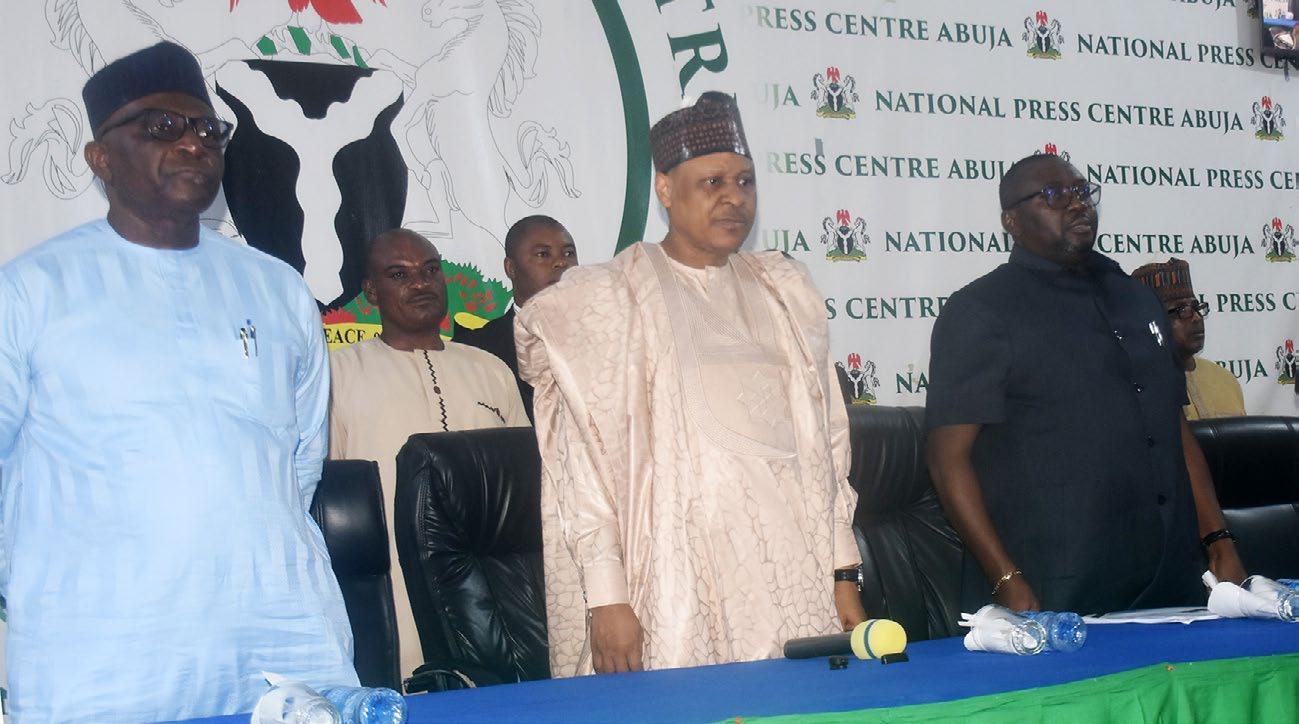
BY ABDULLAHI YUSUF
The New Nigerian Peoples Party (NNPP) in Kano State has strongly denied rumours of Senator Rabiu Kwankwaso’s impending defection to the All Progressives Congress (APC).
The Chairman of the party, Alhaji Hashimu Dungurawa, stated this while fielding questions from Journalists in Kano on Friday.
THEWILL recalls that the Chairman of the APC in Kano State, Alhaji Abdullahi Abbas, had described the speculated defection of Senator Rabiu Kwankwaso to the party as a welcome development.
Abbas made the statement on Friday, while addressing a press conference at the party’s headquarters along Maiduguri Road, Kano.
“Of recent, the attention of the party has been drawn to speculations of the impending decamping of the leader of the expelled faction of
the NNPP, Sen. Rabiu Musa Kwankwaso, into the party. “This is a welcome development, especially given the fact that the APC remains his last political refuge as he has successfully destroyed his relations with all other political groupings in the country”, he said.
Responding to Abbas’ statement, Dungurawa said Kwankwaso does not have any plans or intention to defect to the APC.
“We have no business with the APC, and do not have any intention to defect to it”, Dungurawa said, dismissing the rumours as mere mischief. He described the APC’s claims as baseless and motivated by desperation.
Dungurawa attributed the APC’s actions to their knowledge of the damage they had caused to the nation’s economy and other sectors during their time in power.
BY KAJO MARTINS, MAKURDI
The Benue State Police Command has confirmed a deadly attack in the Gbagir area of Ukum Local Government Area, Benue State, where five farmers were killed. According to the police, bandits encountered the farmers and began shooting sporadically, resulting in the fatalities.
According to the PPRO, upon receipt of the report, the Commissioner of Police, Benue State Police Command, CP Steve Yabanet, ordered tactical teams to move to the area and join forces with police officers on the ground and other security agencies to forestall further attacks.
BY FELIX IFIJEH
AMagistrate Court in Apapa, Lagos, has freed Quadri Yusuf Alabi, a 17-year-old boy detained in January, on a trumped-up charge of armed robbery.
Quadri became prominent after standing in front of the convoy of the Labour Party presidential candidate, Peter Obi, during the party’s 2023 presidential campaign rally in Lagos.
The teenager had been remanded at the Medium Security Custodial Centre in Kirikiri since January 26, 2025, following what his legal team described as a “diabolical frame-up” by the police at Amukoko Divisional Headquarters.
His lawyer, Inibehe Effiong, said in a post on social media that Quadri was abducted by two known area boys identified as Lege and Baba Waris, who had previously harassed him over donations he received during the 2023 election season.
“Quadri was returning from work when he was grabbed by these individuals, who have repeatedly threatened him for not sharing financial gifts he received. His family was even pressured by the Baale (community leader) to appease the area boys with a cow, rice, and a feast”, he explained.
Inibehe said that Quadri, who was initially accused of involvement in a street fight, was charged with armed robbery by the police.
“Shockingly, he was grouped with four adult suspects with no known ties to him. The police also falsely listed his age as 18 to avoid the scrutiny that comes with juvenile cases”, he added.
In a statement on Friday, the Command’s Police Public Relations Officer, ACP Sewuese Anene, said a simultaneous attack was also carried out in Logo local government area, where another twelve persons were killed before the arrival of the police.
“However, Security agencies within the Sankera axis are still engaging the bandits as they retreat to the forest around Taraba state axis”, the statement added.
The CP warns social media users who are reporting unconfirmed reports and inciting the general public to desist from such actions that are capable of creating unnecessary tension in the state.
The statement quotes the Commissioner of Police reiterating his commitment to fight the attackers and encourage people of Sankera axis to continue to cooperate with the police as the operation is ongoing.
However, Magistrate Adetola Olorunfemi discharged Quadri after the Director of Public Prosecutions (DPP) of the Lagos State Ministry of Justice found no evidence to support the allegations against him. In his legal advice, the DPP recommended the non-prosecution of Quadri and another defendant, one Muiz Animashaun.
Speaking with newsmen after the court’s sitting, Inibehe commended the DPP for standing by the truth. He called for an orderly room trial of the DPO of Amukoko Divisional Headquarters, the IPO, Inspector Odigbe Samuel, and other officers who participated in what he called the “evil, sinister, oppressive, and corrupt scheme of framing up a teenager for armed robbery at the behest of rogue ‘Area Boys”.





L-R: Finance Director, Nigerian Breweries Plc, Ben Wessels Boer; Non-Executive Director, NB Plc, Adeyinka Aroyewun; Managing Director, NB Plc, Hans Essaadi; Board Chair, NB Plc, Juliet Anammah; Company Secretary/Legal Director, NB Plc, Uaboi Agbebaku and Non-Executive Director, NB Plc, Roland Pirmez, during the 79th Annual General Meeting of the company held in Lagos, recently.
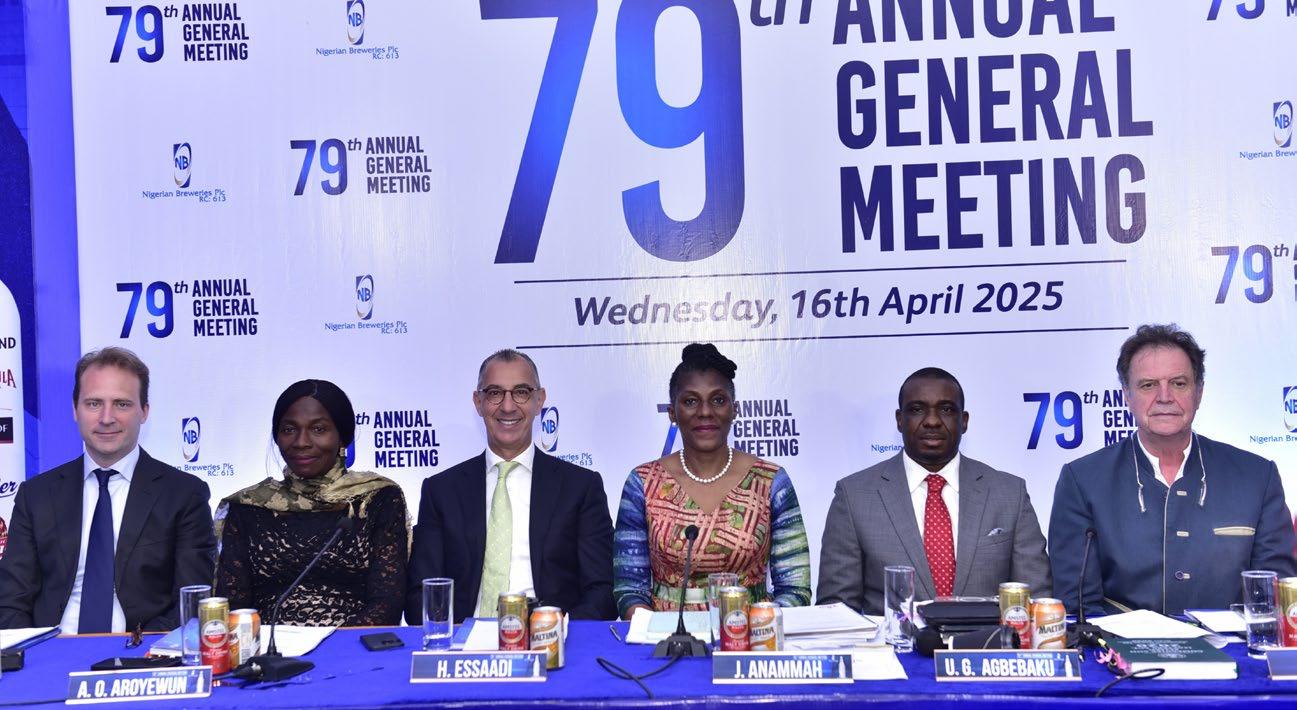
BY FELIX IFIJEH
The Minister of the Federal Capital Territory (FCT), Nyesom Wike, has defended President Bola Tinubu’s decision to declare a state of emergency in Rivers State, saying it saved the state from plunging into anarchy.
President Tinubu had, on March 18, declared a state of emergency in Rivers, suspending the governor and the state House of Assembly for six months. He also appointed a former Chief of Naval Staff, Vice Admiral Ibok-Ette Ekwe Ibas (retd.), as the state’s Administrator.
Speaking during a media chat on Friday, Wike said the proclamation was necessary to prevent a complete breakdown of law and order.
“The President did not want the state to descend into anarchy. He did the right thing. Without the declaration of the state of emergency, funds would not have been allocated to the state,” he said.
Commenting on the suspension of Governor Siminalayi Fubara, Wike expressed disappointment that the governor had not reached out to him to


discuss and resolve the issues. “Has anybody taken it upon themselves to say, ‘This is where we are?’ If I am the cause of the problem, has he ever called me as an elder to say, ‘Let us sit down and talk’?” Wike queried.
The former Rivers governor also threw his weight behind Tinubu’s appointment of a sole administrator to manage the state’s affairs.
While acknowledging that the declaration of emergency rule is an aberration, Wike maintained that, given the prevailing situation in Rivers, the President acted in good faith and made the right decision. He argued that Fubara missed an opportunity to resolve the crisis when President Tinubu invited all warring parties to Abuja for peace talks.
According to him, instead of embracing the reconciliation process, Fubara allowed himself to be misled by some elders from the state.
Nevertheless, Wike said he remains open to peace and reconciliation with the suspended governor.
Terrorists suspected to be members of Boko Haram have attacked the Yamtake community in Gwoza Local Government Area of Borno State. Yamtake is one of the communities where Internally Displaced Persons (IDPs) were recently resettled by the Borno State Government. Borno South Senator, Ali Ndume, said the attack, which occurred on Thursday night, left two soldiers and an undisclosed number of civilians dead. “It is very sad that two soldiers paid the supreme price, while an unspecified number of innocent civilians were among the casualties”, he said.

Ndume urged the federal government to support the military with advanced Technology, Equipment, Arms, Ammunition, and Motivation.
“Let me, therefore, use this opportunity to advocate for the setting up of Armed Community Defence to complement the efforts of the military. This is because men of the Civilian Joint Task Force (CJTF), hunters and vigilantes have been doing their best, but they have limitations, as they only carry dane guns, sticks, which they found very difficult to confront the terrorists”, he said.
BY ANTHONY AWUNOR
The National Agency for the Prohibition of Trafficking in Persons has intensified its crackdown on organised human trafficking networks, arresting two Abuja-based suspects believed to be the masterminds behind a transborder syndicate operating across West Africa and the Gulf of Guinea.
The suspects, 32-year-old Emmanuel Uzor Igwe and 30-year-old Ugochukwu Christian, were identified by some victims currently stranded in Côte d’Ivoire during conversations with popular human rights activist and social media influencer, Martins Vincent Otse, also known as VeryDarkMan (VDM). This prompted his intervention and a subsequent visit to NAPTIP’s headquarters in Abuja. Operatives apprehended the suspects at their lavishly furnished mansion located in a popular estate in Lugbe, Federal Capital Territory. The property, equipped with high-tech security features, reportedly served as both their residence and operational base.
During the raid, led by NAPTIP’s Head of Operations, two suspected victims of human trafficking were also rescued. The operation lasted several hours due to restricted access created by the property’s advanced facilities.
Preliminary investigations revealed that the victims had been recruited by the suspects, sworn to oaths of secrecy, and subjected to intense sexual grooming. The operatives found the victims naked and involved in sexual acts at the time of the rescue.
One of the victims, who requested anonymity, disclosed that she was recruited from an eastern state with the promise of a lucrative job at a mall in Côte d’Ivoire.
“They told me I would be paid in foreign currency and that I would have to repay them 2.2 million CFA francs. They also took us to a shrine located about three hours’ drive from Gwagwalada to swear an oath. I can’t remember exactly where it was,” she said.
The arrest followed intelligence gathered through NAPTIP’s social media platforms and information provided by a sister security agency, pinpointing the suspects’ location.
Last Thursday, VDM visited NAPTIP headquarters to express concern over the plight of Nigerian trafficking victims in Côte d’Ivoire. He pledged to work with the agency to create awareness and support rescue efforts.

Bayelsa State governor, Senator Douye Diri, has called for calm over moves by the federal government to create new local government councils in the country. The people of Kolo recently embarked on a protest over the alleged relocation of a proposed local government headquarters from their community to Emeyal.
Speaking during a meeting with representatives of Emeyal and Kolo communities on Wednesday at the Government House, Yenagoa, Governor Diri explained that the notice from the federal government for the creation of new local government areas was received late, leaving the state government with a very short time to make the decision.
He said that upon receiving the information, he alerted the House of Assembly to immediately develop the proposed councils.
The governor emphasised that councils were yet to be created and that nobody knows how the ongoing process will end. He further stated that historically, no civilian administration had been able to create local governments.
The state’s helmsman called for calm, saying Kolo was still the headquarters of a rural development authority.
He expressed disappointment over the protest, saying those aggrieved in any situation should register their grievances legally and through official means.
Governor Diri also urged Bayelsans to be wary of those who introduce politics into everything and create divisions because of their personal interest, saying such people do not mean well for the state.
He equally emphasised the need to place the development of the state above historical arguments, insisting that the attempt to create new councils was in the interest of the state.
“I heard about the protest. For your information, nobody has created any local government. These issues are everywhere and not only in your place.
“Let us be development-oriented more than what our
forefathers have done. It is true we do not want to lose our history, but if we have to adjust, then we should. Protest is not the first recourse to settle issues.
“It was an emergency that I asked the Speaker and members of the assembly to handle. It was hurriedly packaged, and I would like to appeal to you that protests should be the last resort.
“We do not want constituency 3 in Ogbia to be at loggerheads. If there are issues, pursue it through the normal and legal process, and not beat the drum of war.
“God has a reason for putting us together in one place. First and foremost, we are Bayelsa and Ijaw people. For all of us from constituency 3, it is not as if local governments have been created, and we all know it is hard for a civilian government to create councils. My advice to the Kolo group is that the deed is already done. Follow it up legally.
“Let the youths in Bayelsa know that not everything requires protest when you can amicably resolve the matter. It is giving the state a bad name and image.
“No matter the misunderstanding, we are still one and the same. Let us try and tolerate one another and not be manipulated by those with political ambition.”
Earlier, Gabriel Ogbara, the representative of Ogbia Constituency 3 and Chief Whip of the Bayelsa State House of Assembly, said legislators from the area consulted widely within the limited time before a decision was reached on the choice of headquarters for the proposed local government area and called for understanding from those who feel aggrieved.
While speaking, King W. D. Amakiri, the Obenobhan of Emeyal, stated that Emeyal was the right community to host the headquarters.
In his remarks, High Chief Solomon Agimaye expressed concern that the interest of the people of Kolo was not protected in the proposal for the new council and appealed to the state government to correct what he called the “gang-up against Kolo”.
BY ABDULLAHI YUSUF
Amember of the House of Representatives representing Rano/Bunkure/Kibiya Federal Constituency of Kano State, Kabiru Alhassan Rurum, has advised hunters in the North to desist from travelling to Southern parts of the country for their activities, citing security concerns.
Rurum said the warning became necessary following the recent killing of 16 hunters from Kano State in Uromi, Edo State.
Speaking on Thursday at Torankawa in Bunkure Local Government Area during a condolence visit to the families of the deceased hunters, the lawmaker expressed deep concern over the risks involved.
He noted that factors such as language barriers, cultural differences, and the presence of local weapons like dane guns, swords, and knives carried by northern hunters could easily spark suspicion and tension in host communities, leading to violence and loss of lives.
“Carrying dangerous weapons and moving around with them, especially in this sensitive period of insecurity across the country, will certainly send a wrong signal and can easily result in chaos. Therefore, our hunters should desist from it,” Rurum said.
He recalled that recently, over 30 hunters from his hometown of Rano were arrested in Ondo State.
“I personally went to see the Governor and presented evidence to prove they were not criminals before they were released. If those who arrested them had acted senselessly like the Uromi attackers, the story would have been different,” he said.
Rurum donated N5 million to the families of the slain hunters and promised to immediately begin the construction of an Islamiyya Primary and Secondary School in the area for the benefit of the orphans left behind.
Also speaking, the State Chairman of a faction of the New Nigeria People’s Party (NNPP), Senator Mas’ud El-Jibrin Doguwa, expressed sadness over the killings, describing the incident as a painful lesson that should guide future actions to prevent a recurrence.



L-R: Director General of the National Identity Management Commission (NIMC), Nasir Isa Kwarra,the Senior Special Assistant to the President on Administration and Operations (Office of the Chief of Staff), Oyinade Nathan- Marsh, Minister of Information and National Orientation, Mohammed Idris, Chief of Staff to the President, Femi Gbajabiamila, Minister of Budget and Economic Planning, Abubakar Bagudu, DG of the National Identity Management Commission, Engr. Abisoye Odudote and Permanent Secretary, Federal Ministry of Finance, Raymond Omachi at the inauguration of the Presidential Committee on Population and Housing Census in Abuja on April 16, 2024.
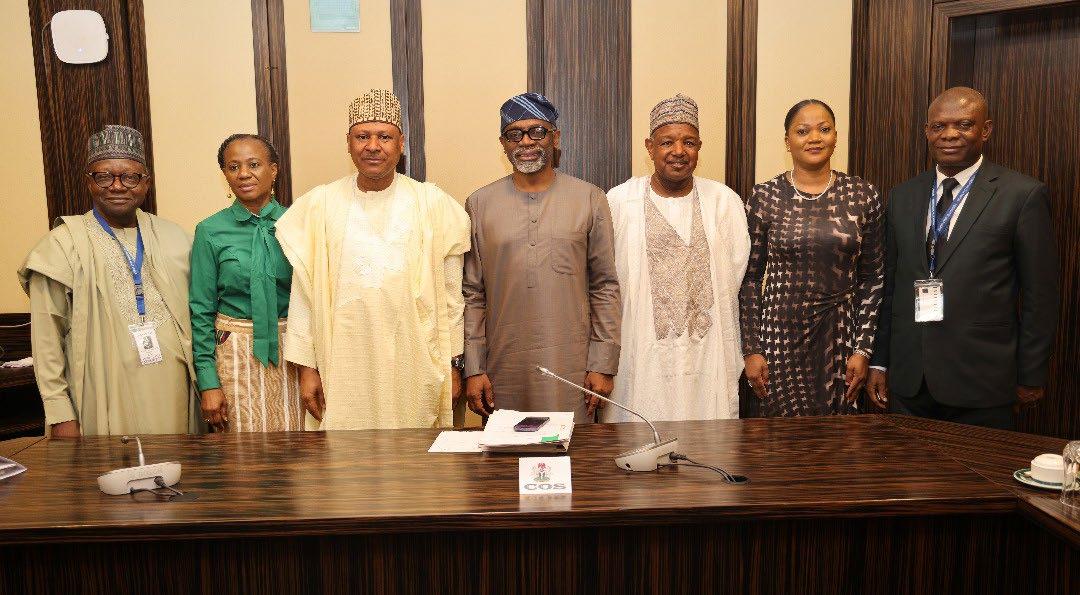
BY SEGUN AYINDE, ABEOKUTA
Chairman, Nigeria Institution of Surveyors, NIS, Ogun State chapter, Surv. Abiodun Liadi, has called on the state government to ensure the safety and security of members against the activities of land grabbers in the state.
He equally appealed to the police and other law enforcement agencies to treat members as professionals and not like touts whenever they meet them on site. Liadi, who spoke in an exclusive interview on Friday, urged the Dapo Abiodun-led administration to protect the lives of surveyors against land grabbers wielding dangerous weapons on site to attack members.
He explained that these land grabbers are known to attack surveyors carrying out their duties using dangerous weapons, including cutlasses, broken bottles, machetes, and planks, which frequently results in injury or death.
The Chairman disclosed efforts by NIS to ensure that members were recognised by their Identity cards and reflective jackets, which he said would soon be launched to safeguard members from life-threatening attacks by land grabbers.
especially in the case of land grabbers. You know, we meet the land grabbers on the site, and they come with dangerous weapons, and the lives of surveyors are at risk in such cases.
“So we thoroughly need security against land grabbers because the issue of land grabbers has to be completely resolved in the state and I believe that this programme called the ‘ mass land tilling’ will go a long way to go a long way to resolve the issue of land grabbing.
“This is actually the programme the federal government will start very soon with the support of the World Bank, they will want all the land in Nigeria to be tilted. And we believe surveyors should get seriously involved in such programmes, and this is to see private surveyors participating more in government programmes.
“We recently visited with the Commissioner of police and we discussed how to identify those who are professionals surveyors against fake ones that are working on site, the issue on how to recognise members with our identity cards, reflective jackets which very soon we will launch and the public will see it that these are true surveyors so that we will be handled differently whenever issues on lands occurs. So that when there are issues of land, the police and other law enforcement agents will know that these are professionals and set them aside and not arrest them”, he added.
BY FELIX IFIJEH

He said that such development would allow the police and other law enforcement agencies to differentiate professional surveyors from quacks and save them from unnecessary harassment and arrest by security personnel when a land dispute occurs.
Liadi also urged the FG to hasten its ‘mass land titling’ programme with the World Bank, whose focus is to certify single ownership of land, so as to rid the country of land grabbing activities and protect surveyors from constant attacks of land grabbers.
He said, “As a surveyor, the major challenge that we are facing is the issue of security of our members, you know, these days you hear of problems with land grabbing.
“It is still important that we live in a secure environment,
Three officers of the National Drug Law Enforcement Agency (NDLEA) have been hospitalised for gunshot injuries sustained after they came under attack from some armed men during a raid operation in the Jahi area of the Federal Capital Territory (FCT), Abuja, on Thursday night.
A statement signed by Femi Babafemi, the spokesperson of the Agency, said the incident occurred when the operatives raided an uncompleted building in the NNPC area of Jahi following credible intelligence and surveillance.
During the operation, the NDLEA team recovered 74 bottles of codeine, 10 litres of codeine syrup, 48 grams of tramadol (225mg), 4.9 kilograms of skunk—a potent strain of cannabis—and five Android phones believed to belong to suspected drug traffickers.
However, as the team made their exit from the location, they were ambushed and came under gunfire from armed men. Three NDLEA personnel sustained gunshot wounds: one was hit in the rib, while the other two were

struck in the back and leg, respectively.
The wounded officers were initially stabilised at the Police Clinic in Garki Area 1 before they were transferred to the National Hospital, Abuja, for further medical attention.
Chairman/Chief Executive Officer of NDLEA, Brig. Gen. Mohamed Buba Marwa (Rtd) expressed appreciation to the staff of the Police Clinic for their prompt support. He also thanked the Chief Medical Director of the National Hospital, who was personally reached by him, for overseeing the treatment of the wounded officers.
The NDLEA boss, who is in Kano on official engagements, also spoke on the telephone with the injured officers to wish them a quick recovery.
He assured them that the Agency will deploy every means at its disposal and work in collaboration with other security agencies to fish out those responsible for the attack.
BY FELIX IFIJEH

he Sole Administrator of Rivers State,Vice Admiral Ibok-ette Ibas (Retd.) is in the spotlight for political, legal and constitutional reasons, one month after his appointment by President Bola Tinubu.
On the legal front, human rights lawyer and a Senior Advocate of Nigeria, Femi Falana, has said that the administrator overstepped his bounds by unilaterally taking decisions that were dangerous to peace and security of the state and its citizens.
On the constitutional front the House of Representatives, which set up an Ad hoc Committee to monitor the administrator, summoned him for a briefing on Thursday. Politically, Minister of the Federal Capital Territory, Nyesom Wike on Friday said Ibas’s appointment was not on the cards as a solution to the crisis generated by his (Wike’s) ongoing struggle for supremacy with the current governor of the state, Siminalayi Fubara.
According to Wike, the plan in his estimation was to see the complete removal of Fubara as Governor of Rivers State, not the six months suspension ordered by President Bola Tinubu when announcing a state of emergency in the state. Wike said, “As a politician, I am not happy with the declaration of Emergency Rule in Rivers State. I wanted the outright removal of the governor. But for the interest of the state, the President did the right thing to prevent anarchy in the state.
“However, people must tell the truth. The governor was gone. He was gone, yes… so when people say the President did this, I say they should be praising him. Every morning, they should go to the President and ask, ‘Can we wash your feet for saving us?’” “Mr president came in and saved the situation, saved Rivers people from that calamity and anarchy,” Wike said.
President Tinubu had on March 18 declared a state of emergency in Rivers, quoting relevant sections of the Constitution to justify his action that he said would stop the lingering political crisis in the state and attendant effects on democracy, security and the well- being of the citizens. The President, in a national broadcast said he felt greatly disturbed by the development. The President said the state had been at a standstill since the crisis started, with the good people of the state not being able to have access to the dividends of democracy.
According to him, it is public knowledge that the Governor Fubara, for unjustifiable reasons, demolished the Rivers State House of Assembly complex on December 13, 2023 and he has, up until now, 14 months after, not rebuilt it. “I have made personal interventions between the contending parties for a peaceful resolution of the crisis, but my efforts have been largely ignored by the parties to the crisis.
“I am also aware that many well-meaning Nigerians, leaders of thought and patriotic groups have also intervened at different times with the best of intentions to resolve the matter, but all their efforts were also to no avail. Still, I thank them,” continued Tinubu. He stated that on Feb. 28, the Supreme Court pronounced a judgment, in respect of about eight consolidated appeals concerning the political crisis in Rivers.
He said the judgment was based on several grave unconstitutional acts and disregard of the rule of law that had been committed by the governor as shown by the evidence before the judgment was pronounced in very clear terms. Tinubu said the above pronouncement came after a catalogue of judicial findings of constitutional breaches against Fubara.
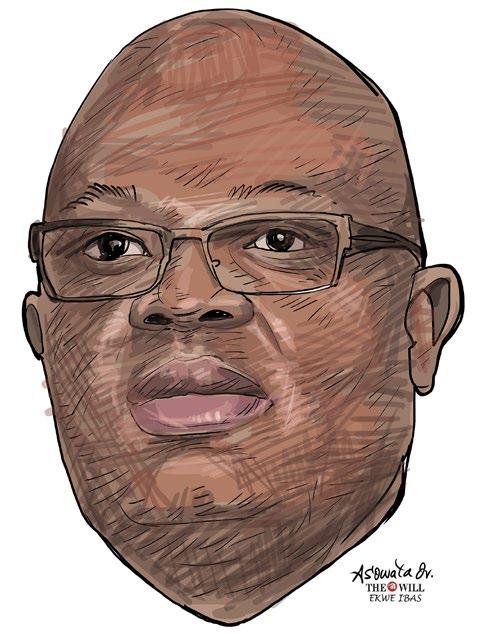
He said the judgment held that 27 members of the House who had allegedly defected to another political party were still valid members of the Rivers House of Assembly and could not be prevented from participating in the proceedings of that House by the governor in cohorts with four members. Tinubu said the Supreme Court made some orders to restore the state to immediate constitutional democracy.
These orders, he said, included the immediate passing of an Appropriation Bill by the Rivers State House of Assembly which was not facilitated. He, however, said some militants had threatened fire and brimstone against their perceived enemy of the governor, who had up till now not disowned them. The President stated that the latest security reports made available to him showed that between Monday and Tuesday before the May proclamation of emergency rule, there had been disturbing incidents of vandalisation of pipelines by some militants without the governor taking any action to curtail them.
In the same week, the House of Representatives Committee directed Ibas to appear before it for a “comprehensive interactive session” on Thursday, April 17, 2025, at the National Assembly Complex, Abuja. This was after it had inaugurated the Committee on oversight function for Rivers State.
According to the House’s spokesperson, Akin Rotimi, “In line with Section 5 of the State of Emergency (Rivers State) Proclamation, 2025, and pursuant to Section 11(4) of the Constitution of the Federal Republic of Nigeria, the House has constituted a dedicated ad-hoc committee to monitor implementation and ensure that governance in the state remains within the bounds of constitutionalism and rule of law,” the statement read. The committee will be chaired by House Leader Prof. Julius Ihonvbere, with the House Minority Whip, Ali Isa J.C, serving as Deputy Chairman. Other members include Isiaka Ibrahim, Idris Wase, Muktar Betara, Sada Soli, Abiodun Faleke, Amos Daniel, Erhiatake Ibori-
Suenu, Blessing Onuh, Iduma Igariwey, Shehu Rijau, Oluwole Oke, Etinosa Amadi, Patrick Umoh, James Barka, Alex Egbona, Isa Anka, and Fatima Talba. Prof. Jake Dan-Azumi will head the committee’s secretariat.
The House of Representatives said it is determined to uphold the supremacy of the Constitution and ensure that extraordinary measures undertaken during the emergency period remain subject to legislative oversight.
Rotimi said the Thursday session would provide a platform for members of the committee to deliberate on preliminary reports and developments emerging from Rivers State since the sole administrator assumed office. The Chairman of the Committee and House Leader, Julius Ihonvbere, said, “This engagement is necessary to ascertain the true state of affairs in Rivers State and ensure that the House remains properly guided in the discharge of its oversight responsibilities in the public interest.”
In his observation, Femi Falana, called on the Federal Government to immediately remove Ibas from office, citing a breach of constitutional procedure and defiance of President Bola Tinubu’s directives. According to Falana the sole administrator’s powers were clearly spelt out in the official Federal Government Gazette, which outlined the terms governing his operations.
According to the document, the sole administrator “shall operate on the basis of such Regulations that may, from time to time, be issued” by President Bola Tinubu. However, Falana stated, “It is common knowledge that President Bola Tinubu has not issued any Regulation for the operation of the Sole Administrator.”
“Despite this, the appointed Sole Administrator has proceeded to make appointments and remove officials who were earlier appointed by Governor Fubara. Describing the development as unlawful, Falana said: “By treating the orders of President Bola Tinubu with contempt, the Sole Administrator has compounded the illegality of his appointment.
“The Sole Administrator ought to be removed without any further delay.”
Falana’s position comes amid a broader political crisis in the state, where the legitimacy of key appointments and the balance of powers between the state and the Federal Government continues to generate intense debate. Already protests for and against, mainly by women, have been ongoing in the state.
As a politician, I am not happy with the declaration of Emergency Rule in Rivers State. I wanted the outright removal of the governor “








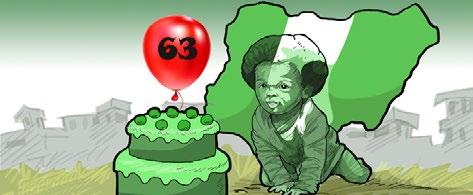














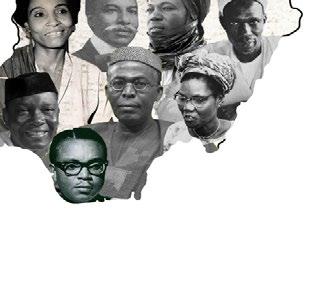






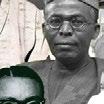








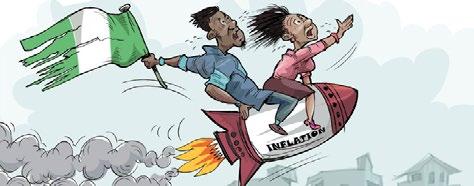


Center Spread Half Page N1, 300, 000
Double Spread N1, 550, 000

Double Spread Half Page N1, 200, 000
10X6 N700, 000
10X5 N650, 000
10X4 N600, 000
10X3 N500, 000
9X6 N440, 000
9X5 N395, 000
9X4 N335, 000
9X3 N310, 000

8X6 N410, 000

8X5 N380, 000
7X5 N320, 000
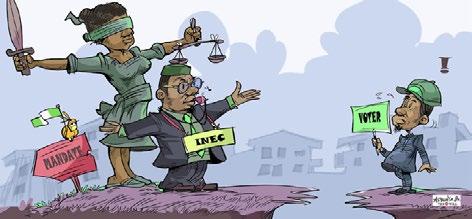



7X4 N315, 000
6X5 N280, 000

6X3 N145, 000
6X2 N85, 000
5X2 N70, 000
4X4 N160, 000
4X3 N95, 000
4X2 N65, 000
3X3 N60, 000
3X2 N50, 000
2X2 N30, 000
2X1 N15, 000
1X1 N7, 000
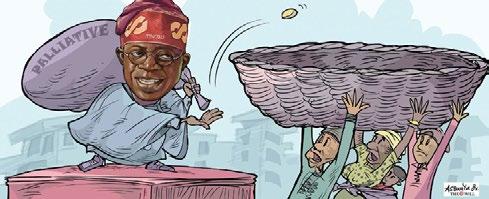
























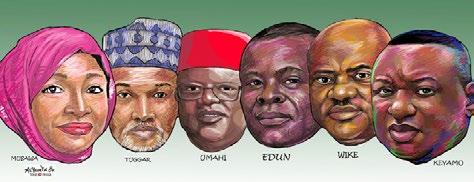

LOne of the major issues concerning liquidity is the huge debt in the sector. We talk about legacy debt to GenCos of almost over N2 trillion and we have an outstanding unpaid subsidy for 2024 of 1.97 trillion. DisCos are owed N450 billion for 2024 electricity subsidy
ast week, the Minister of Power, Adebayo Adelabu, disclosed that the Federal Government was owing electricity generation companies Gencos and distribution companies, DisCos, over N4 trillion.
While speaking at the public presentation of the National Integrated Electricity Policy, NIEP, and Nigeria Integrated Resource Plan, NIRP, in Abuja last Thursday, the minister said the indebtedness is N2 trillion apiece to each company for 2024 and an additional N450 billion for electricity subsidy accrued in 2024.
“One of the major issues concerning liquidity is the huge debt in the sector. We talk about legacy debt to GenCos of almost over N2 trillion and we have an outstanding unpaid subsidy for 2024 of 1.97 trillion. DisCos are owed N450 billion for 2024 electricity subsidy,” Adelabu admitted. Surprisingly, he admitted that this debt can cripple the capacity of the companies, in terms of payment for inputs such as gas, service maintenance of turbines and payment of staff.
Apart from also lamenting the immediate impact of this indebtedness on the performance of these companies such that manufacturing companies in their numbers have disconnected from the national grid, the minister notably avoided mentioning the burden that the average Nigeria consumer has been made to bear as a result of illegality.
To say that the Federal Government’s indebtedness to the GenCos and DisCos is illegal is to be mild. It is, in fact, criminal. To allow the debt to accumulate to such a large sum of money, to the extent that the companies
cannot perform optimally, is just as a disincentive to enterprise as it is actionable.
While the government was busy taxing Nigerians through an obnoxious policy of classification into bands to make for the so-called efficient supply of power, it failed to fulfil its obligation to pay for its consumption from the same companies.
For a country where electricity output has stagnated at between 5,000 megawatts and 7,000 mega watts capacity for decades, this indebtedness by the government shows the levity and laxity with which this sector has been handled over the years.
When the government, which controls the resources of the country can owe N4 trillion to private electricity companies, who goes about enforcing payments? Yet, these same companies do not hesitate to mete out punitive measures against Nigerian electricity consumers in cases of default in payment.
In fact, public consumers have had bitter stories to tell about horrible treatment by DisCos, from illegal disconnection and arbitrary estimated billing that ought to have been abolished in the past 10 years, if the government had pursued it with a sense of purpose, even its own policy on metering and power generation.
This lack of a sense of purpose is the source of this outrageous N4 trillion debt owed to GenCos and DisCos.
It is alarming that Nigerians would probably not have learnt about this indebtedness if the Chairman of Transnational Corporation (Transcorp) Plc, Mr Tony Elumelu had not called on
the Federal Government to expedite action on the payment of debts owed to electricity generating companies, GenCos, before Adelabu’s disclosure.
Speaking at the company’s 19th Annual General Meeting in Abuja recently, Elumele said the problem had been with the electricity sector for the past 12 years
“The main dominant challenges of the power sector namely, liquidity infrastructure and gas availability remain unresolved 12 years after some of us invested heavily in this sector. As at date the Federal Government owes your company over N600 billion ($400 million),” he lamented, adding: “Much as we, as patriotic Nigerian investors, are committed to supporting the efforts of the government in fixing the Nigerian economy we have been under the excruciating burden of subsidising the sector as producers who do not get paid for the electricity we generate; we put on the grid and it is consumed on the grid.”
When electricity generation and supply was unbundled over a decade ago and privatised, no sensible person would have thought that the Federal Government that often talks about the role of the private sector in the growth and development of the country would contribute to strangulating electricity, a major source of industrialisation, manufacturing and entrepreneurship. Lack of due process and accountability is writ large on this indebtedness.
We call on the government to pay up the debt quickly. According to the minister, the government would pay N2 trillion by December! Even so, this is a national scandal.
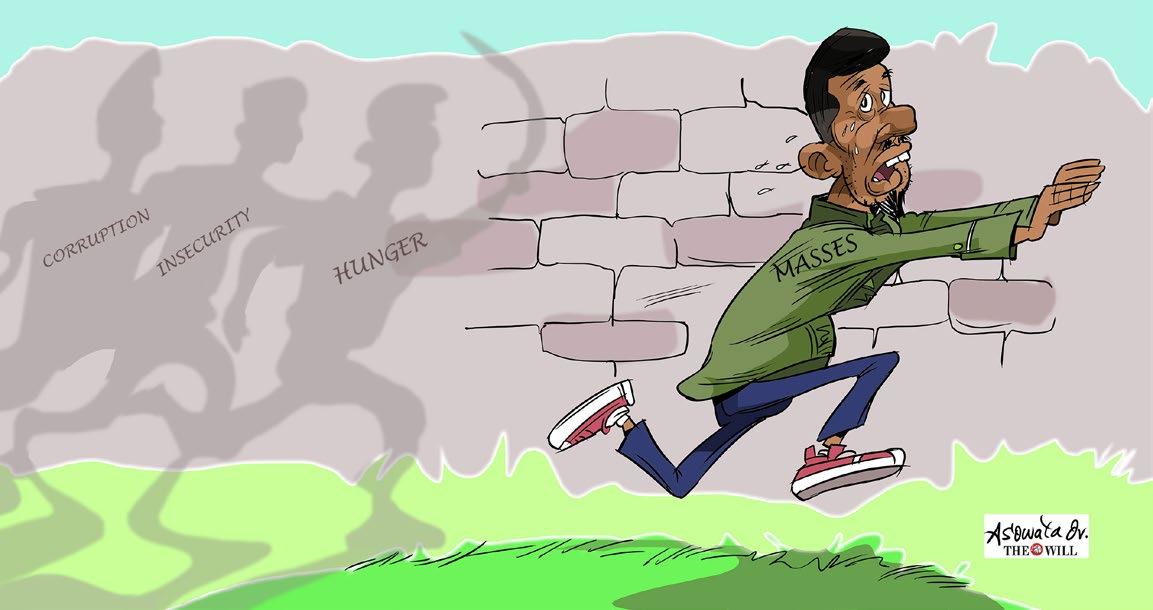




BY PROMISE ADIELE
This boy, he will kill his own father, and then marry his own mother”. That was Baba Fakunle.
He delivered the prophecy with measured certainty, which validated his prophetic designation in Ola Rotimi’s The gods are not to Blame. Baba Fakunle’s source was Ifa, the famed prognostic essence assessed through the casting of Opele, stringed objects of divinationAt the end of the play, the prophecy was precisely fulfilled. Odewale killed his father, King Adetusa, and married his mother, Queen Ojuola. Son and mother had four children. Thus, the people of Kutuje depended on Ifa’s prophetic attributes to uncover the future. In Chinua Achebe’s Things Fall Apart, the people of Umuofia depended on the prophetic revelations of the Oracle of Hills and Caves to look into the seeds of time.
Those were the good old days, when traditional prophetic channels were effective, free from human desecration and pollution. In contemporary times, following the advent of Western religion, prophecy acquired a totally different identity where people for diverse purposes embrace it as a social-regulating mechanism for manipulating people’s emotions, a manoeuvring, predicting procedure for self-enrichment or as God’s honest pronouncement to humanity.
Of course, the three categories of prophecies above encapsulate our understanding of that spiritual methodology in the modern world.
However, the big question is, into which of the categories does Dave Umahi’s latest prophetic claim belong? Should we accept his prophecy as a social-regulating mechanism for manipulating people’s emotions, or as a manoeuvring, predicting procedure for self-enrichment or as God’s honest pronouncement to Nigerians?
For clarity, Dave Umahi, Nigeria’s Minister of Works, recently prophesied that Kaduna State governor Uba Sani and Bola Tinubu will be in power for eight years.

According to him, “I want to assure you, my dear governor, Uba Sani, that I’m also a prophet. It was only David in the Bible that was a prophet and a preacher, and God has told me that you will do 8 years, and Bola Ahmed Tinubu will do 8 years”.
I am not aware of Dave Umahi’s ordination as a pastor or priest of some traditional divinity. But his allusion to David in the Bible as a corollary of his name Dave devalues that revered chosen man of God in the Holy Book.
Also, given his anti-people pronouncement, it is improbable that God will speak through his indeterminate spiritual consciousness. And because he is not a known clergy member in the prophetic cadre, the possibility of using prophecy for self-enrichment is farfetched. That leaves us with the first category of prophecy – as a
IF

social regulating mechanism for manipulating people’s emotions.
If Dave Umahi is a prophet, his inspiration certainly does not derive from the Almighty God or any recognized traditional source like Ifa or the Oracle of Hills and Caves. These sources can be viewed as genuine mediums which take into account the observable realities of people’s conditions and are therefore interested in their welfare. Will Ifa, looking at the anguish inflicted on Nigerians by the present power protocol, be so fatalistic as to wish Nigerians another four years under the same administration? Will the Oracle of Hills and Caves be so insensitive to the plight of millions of Nigerians to unleash further privation on the people for another four years? Will the Almighty God extend the evisceration of Nigerians under the present administration for another
Although God can punish a nation by afflicting it with a horrendous leader, Nigerians believe that their prayers should abate the current economic and political infirmities with no further extension. Therefore, we can rightly say that Dave Umahi’s pronouncement, seeking to prolong the current economic asphyxiation in the country, is insensitive, lacking any spiritual source, and insulting to the Nigerian electorate. There are many Umahis in the country who willingly submit themselves to the hypnosis of sinister mediums by declaring that Tinubu will be returned in 2027, whether Nigerians like it or not.
THE ALMIGHTY DECIDES TO STRETCH NIGERIA’S AFFLICTION IN 2027, WE MUST EMBARK ON A COLLECTIVE SUPPLICATION AND DIVERSE PROPITIATION TO THE SUPERNATURAL REALM, EVERY MAN IN HIS LANGUAGE TO APPEASE THE POWERS THAT RULE THE EARTH
Of course, given the country’s current political actualities and the associated chicanery, the current administration may retain power in 2027. But if we consider the socio-economic realities on the ground, if we ponder the height of economic depredation which Nigerians suffer daily from the government’s policies, if we reflect on the spiralling cost of living across the country which are inconsistent with the favourable economic indices spewed by misbegotten global institutions, it becomes unlikely that Nigerians would be willing to step into the same river again. The prophecies about Tinubu’s retention of power in 2027 are more disconcerting because they completely disregard the wishes of Nigerians and their choices at the polls. Umahi’s declaration gives the twitchy feeling that Nigerians are inconsequential in who becomes their president in 2027. Such undemocratic behaviour is evident of a demagogue removed from the immediate, constricting challenges of the masses who daily wallow in untold hardship and destitution. Perhaps we can understand prophecy as a declaration of an impending doom. We have people classified as
BY TUNDE RAHMAN
The special relationship between President Bola Tinubu and former President Muhammadu Buhari has witnessed many remarkable moments.
It has experienced dramatic and exciting times, just as there have been challenging moments. Life changing and sweet memories abound between the two great leaders. Between the two great men, there are recollections of might-have-beens. There are also open testimonies about the gains of the partnership and words of commendation as well as scornful moments.
Nonetheless, the two leaders have trudged on to the admiration of their mutual friends and associates, and bewilderment – I dare say, disappointment – of others who would wish both had long parted ways.
About pleasant times, one important moment readily comes to mind. It was towards the end of 2017, two years into the Buhari presidency. The former president was traveling to Abidjan, Cote d’Ivoire, for the 5th African Union-European Union Summit, which took place from November 28th to 30th, and had invited Asiwaju Tinubu to join his entourage. Coming from Buhari, the invitation was a pleasant surprise to the then All Progressives Congress National Leader, given that the administration he worked very hard, with others, to bring into existence, had largely sidelined him after taking over power in 2015. The Cote d’Ivoire invitation, therefore, represented one of the few occasions he would be directly contacted. As it turned out, taking Tinubu along on that trip proved helpful. Tinubu attended a couple of official meetings and engagements with the former president, including the meeting with the Nigerian Community in Cote d’Ivoire. Buhari alluded to this
during that trip.
Speaking about Tinubu, while addressing the Nigerian Community in that country on the sidelines of the summit, the former president had said: “I must thank our Leader, Asiwaju Bola Ahmed Tinubu. He has brought me a very beautiful piece of information, which I was not aware of until I sat down and read it. Thank you very much for your hard work, and I will discuss that paper with you.”
Many were wondering at the time as to what piece of information Tinubu had offered Buhari. But at that time, 2019 was around the corner, and Buhari needed to rally his troops for re-election. There was a need, in my view, to tap Tinubu again for his strategic support and rich political network.
Each time Tinubu had any opportunity to visit Buhari at the Presidential Villa, it was to offer ideas and suggestions about the way forward for the government and the country. I know this as a fact because I was always there with him.
THE TWO LEADERS HAVE TRUDGED ON TO THE ADMIRATION OF THEIR MUTUAL FRIENDS AND ASSOCIATES, AND BEWILDERMENT – I DARE SAY, DISAPPOINTMENT – OF OTHERS WHO WOULD WISH BOTH HAD LONG PARTED WAYS
Tinubu had helped Buhari to power in 2015 after the General’s three previous unsuccessful attempts. An alliance between Buhari’s Congress for Progressives Change (CPC) and Tinubu’s Action Congress of Nigeria (ACN) that had earlier hit the rocks in 2011 was resuscitated in the run-up to the 2015 election, engendering a working alliance between the North-West and South-West. This was the alliance that put the wind in Buhari’s sail and fired him to the presidency.
For the first time in a long while, the former president recently spoke on this valuable support and fine relationship with Tinubu in a telephone call to the President on his 73rd birthday.
According to a statement by his spokesperson, Mallam Garba Shehu, Buhari underscored the bond between him and Tinubu.
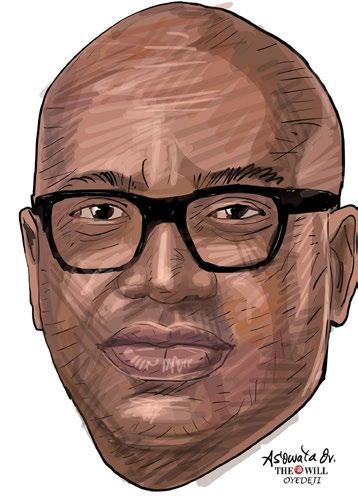
First HoldCo (formerly FBN Holdings) Plc has released its audited financial results for the year ended December 31, 2024, reporting a 105.71 percent rise in gross earnings to N3.213 trillion - from N1.562 trillion achieved in FY 2023. This hinges on the impressive performance achieved in several aspects of its operation such as a 156.51 percent Y-o-Y jump recorded in Net interest income which rose to N1.401 trillion from N362.2 billion 2023. Similarly, Net fees and commission income climbed to N244.88 billion from N187.1 billion constituting a 30.91 percent increase Y-o-Y.
Responding to the growth trajectory, Pre-tax profit of N781.88 billion, representing a 124.77 percent increase Y-o-Y compared to N347.87 billion recorded in 2023 added to the success story of the behemoth financial services establishment.
EDITOR Sam Diala
Speakers, participants and other guests at the recently concluded 36th edition of the Central Bank of Nigeria (CBN) seminar for Finance Correspondents and Business Editors held in Abuja, agreed that implementing the banking recapitalisation scheme poses a daunting task for the Nigeria InterBank Settlement System (NIBSS).
The forum also concluded that various environmental and regulatory challenges which are parallel to the smooth-running of the exercise constitute a major concern to both the regulators and the operators.
NIBBS provides the infrastructure support that drives the financial services industry, especially the payment systems.
Specifically, NIBSS is a shared service payment infrastructure company that facilitates electronic payments within the Nigerian financial system and acts as a central switch, ensuring interoperability between various financial institutions and enabling seamless electronic fund transfers and payments.
The kernel of NIBSS functions centres on interoperability, that is enabling all banks, mobile payment operators, and other financial institutions to send, receive, and process funds and other instruments electronically through a common channel.
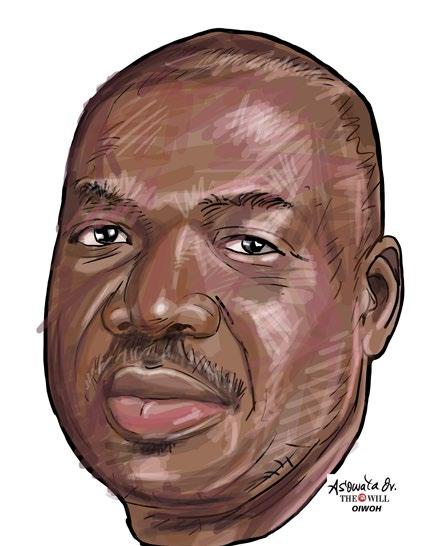
THEWILL recalls that on March 28, 2024, the CBN issued a directive to financially reshape the domestic money banks (DMBs), which spiked a theatre of competition among the operators.
In a direct memo, the CBN revised the capitalisation requirements, setting new benchmarks for banks with international operations at N500 billion, national licences, N200 billion, and regional licences, N50 billion. This directive, a crucial step towards a stronger banking sector, initiates a time-sensitive two-year journey that will start on April 1, 2024, and end on March 31, 2026.
Going by the data available, commercial banks in the country would require a combined N3.894 trillion to meet the new baseline capital requirements.
This would trigger capital raising efforts to the combined tune of N3.894 trillion to meet the new baseline capital requirements. The capital raising would be from both domestic and international markets which the banks have already keyed into.
“The banking recapitalisation is a huge challenge to the financial services sector because it has opened an expressway for stiff competition and it is going to separate the ‘boys’ from the ‘men’ of the banking industry. A lot of innovations, investments, transformation and human capital deployment both directly and indirectly will reshape the industry,” said Prof. Ken Ife, Chief Economic Strategists, ECOWAS Commission, who chaired the seminar session on the first day.
According to Prof Ike, to grow a $1 trillion economy by 2023 requires strong banks with adequate capital base to finance the real sector, not just focusing on forex trading. He emphasised that the banks must invest hugely in infrastructure that would drive a new era of digital banking and the infrastructure must be of global standard in performance such that investor and customer confidence are not eroded.
Prof Ike, who is the Lead Consultant on Private Sector Development to the ECOWAS Commission, emphasised that those responsible for the digital infrastructure must prepare for the huge challenge the banking capitalisation would throw up.
In his presentation entitled ‘Banking Recapitalisation Towards a One-Trillion Dollar Economy: Industry Perspective’, Group Managing Director/CEO, United Bank for Africa (UBA), Dr Oliver Alawuba, noted that “The banking recapitalisation initiative represents a landmark policy shift aimed at aligning Nigeria’s financial system with its ambitious economic goals.”
Profit after tax also saw significant growth. It rose by 115.12 percent to N663.490 billion, driving the Gross earnings that surged by 105.71year year-on-year, hitting N3.212 trillion. Customers’ deposits rose by 61.03 percent to N17.171 trillion from N10.66 trillion in 2023, while Loans and advances to customers grew to N8.768 trillion from N6.35 trillion representing a 37.88 percent Y-o-Y.
According to the results, Total assets rose to N26.524 trillion, showing a 56.60 percent Y-o-Y compared to Continues on page 35
According to available data, under commercial banks with international authorisation of N500 billion, in meeting with the new capital base, Access Bank, Fidelity Bank, FCMB, First Bank, Guaranty Trust Bank, Union Bank, United Bank for Africa and Zenith will be raising a capital of N248.19 billion, N370.30 billion, N374.71 billion, N248.66 billion, N361.81 billion, N351.91 billion, N384.19 billion, and N229.25 billion respectively.
Also, CitiBank Nigeria Limited, Polaris Bank, Stanbic IBTC Bank, Standard Chartered Bank Limited, Sterling Bank, Titan Trust
SPECIFICALLY, NIBSS IS A SHARED SERVICE PAYMENT INFRASTRUCTURE COMPANY THAT FACILITATES ELECTRONIC PAYMENTS WITHIN THE NIGERIAN FINANCIAL SYSTEM AND ACTS AS A CENTRAL SWITCH, ENSURING INTEROPERABILITY BETWEEN VARIOUS FINANCIAL INSTITUTIONS AND ENABLING SEAMLESS ELECTRONIC
Dr Alawuba, whose presentation dwelt on key success factors for attaining the goal of the recapitalisation exercise, emphasised that critical issues such as capital adequacy, FX instability, governance, cyber risks, and market readiness must be in place.
“This strategic initiative is central to achieving the country’s vision of a $1 trillion economy by 2030, positioning banks not just for compliance but as true economic enablers.
“Success will require improved supervision, policy incentives, capacity building, and collaborative execution among financial institutions, government, private sector, and media partners.
“Nigeria’s transformation depends on how effectively the financial sector mobilises capital, supports infrastructure, strengthens the real sector, and accelerates digital




Continues from page 34 innovation.
“As the saying goes, strong economies are built on the foundations of strong banks.”
Enumerating the challenges against the $1 trillion economy vision, Dr Alawuba, who is also Doyen of Bank MDs, emphasised on Ease of Doing Business environment, noting that Nigeria ranked 131 out of 190 countries in 2019 (Brazil: 124; China: 32; India: 62; Indonesia: 73), which is a negative attribute. This falls under Regulatory and Policy Challenges.
Others are Macro-economic Headwinds (such as high inflation, largely influenced by currency depreciation); Financial Accessibility and Inclusion (including limited access to credit by SMEs, which account for over 80% of businesses in Nigeria); Security Concerns (security challenges, particularly in agriculture and oil-producing areas, limit investment and economic activity), and Infrastructure Deficit (deficits in energy, transportation, and digital infrastructure which increase business costs and reduce productivity).
The three-man colloquium moderated by a Television anchor-person, Nancy Nnaji, included Prof. Uche Uwaleke, Professor of Capital Markets, Nasarawa State University, Keffi; Mr Musa Jimoh, Director, Payments System Policy Department, CBN; Mr Akin Morakinyo, and Mr Sunday Michael Ogwu, Group Business Editor at Daily Trust, Abuja.
The team emphasised on building a strong infrastructure to support the expansion in banking services and the competition that would evolve as the players push for higher performance standards. The team highlighted the importance of NIBSS in supporting what they referred to as the emerging sophisticated digital banking environment.
“NIBSS has been supportive in the emerging complex digital banking regime that is now driving the fast-growing fintech sector. We don’t know if NIBSS can cope with the rapid expansion in a sophisticated digital financial economy because the demands will be huge and challenging,” said a participant whose voice echoed the concern of the others that “we are going into a new world of banking with digital banking infrastructure of global standard”.
Continues from page 34
Nigerian banks have engaged in systems upgrade in recent times in readiness for the post-recapitalisation economy. Similarly, NIBSS says it now has top-notch technology infrastructure and security measures to provide payment and settlement services that are among the best in the world.
According to Mr Musa Jimoh, Director, Payments System Policy Department, CBN, Nigeria can boast of digital payment infrastructure that effectively reduces operational and credit risks in funds transfer between financial institutions.
“NIBSS provides the infrastructure for automated processing, settlement of payments, and fund transfers between banks, discount houses, and card companies,” the company said on its website.
Highlighting the imperatives of the recapitalisation policy, the Deputy Governor, Corporate Services, CBN, Ms Emem Usoro, emphasised that the global financial system and architecture have assumed a new dimension, necessitating proactive actions by countries.
In the keynote address delivered at the 36th edition of the CBN Seminar for Finance Correspondents Association of Nigeria (FICAN) and Business Editors, held at Ibeto Hotels, Abuja, 14th – 15th April, 2025, and attended by over 200 participants, Ms Usoro emphasized that the banking recapitalization was important in achieving Nigeria’s dream of a $1 trillion economy by 2030.
“Building a one trillion-dollar economy is not an easy task. It would require careful planning, robust and clear policy direction, dutiful implementation, and averred commitment from stakeholders that would galvanise the various sectors of the economy.
“Today, our economy is valued at approximately $250 billion. As we aspire to build a 1 trillion dollar economy, all hands must be on deck to push with strong ideas to sustain this vision that has very noble capabilities of making our economy develop faster and improve the quality of lives of our citizens,” she said.
The theme of the seminar was ‘Playing the Global Game: Banking Recapitalisation Towards a 1 trillion dollar economy’.

Central Securities Clearing System (CSCS) Plc has released its audited consolidated and separate financial statements for the year ended December 31, 2024, delivering a robust performance marked by double-digit growth in revenue and profitability.
Total revenue surged by 37% to N26.1 billion in 2024, up from N19.0 billion the previous year. Profit before tax also rose significantly, climbing 24% to N13.8 billion, compared to N11.2 billion in 2023.
The impressive results were largely driven by a 62% year-on-year increase in fee-based income, which rose to N11.9 billion from N7.3 billion, fuelled by heightened capital market activity. Ancillary services also contributed strongly, growing 27% from N8.1 billion in 2023 to N10.3 billion, buoyed by optimized service delivery and increased customer engagement.
CSCS maintained a strong balance sheet, with total assets rising 22% to N64.4 billion from N52.8 billion in the previous year. Key financial ratios also improved, with return on average equity at 30%, return on average assets at 20%, and earnings per share increasing to 239 kobo from 202 kobo in 2023.Temi Popoola, Chairman of the Board of CSCS, praised the performance amid a challenging economic climate. “Despite the macroeconomic headwinds of 2024, we delivered strong results across key financial and operational indicators.

N16.9 trillion. This shot Shareholders; fund to 2.79 percent against N1.71 trillion in 2023, representing an increase of 60.01 percent.
According to the financial statements, the group has 35.90 billion shares outstanding.
Notably, Femi Otedola increased his total (direct and indirect) shareholdings by 108.83 percent, from 2.03 billion shares in 2023 to 4.23 billion shares in 2024, bringing his stake to 11.80 percent of the company’s total shares.
The Board of Directors has recommended a dividend of 60 kobo per ordinary share of 50 kobo each, amounting to N25.13 billion, up from N14.36 billion distributed in 2023 – an increase of 75 percent which will excite the shareholders.
First HoldCo closed its last trading day
(Thursday, April 17, 2025) at N24.60 per share on the Nigerian Exchange (NGX), recording a 1.6 percent drop from its previous closing price of N25.00.
Data from the NGX shows that First HoldCo began the year with a share price of N28.05 but has since lost 12.3 percent off that price valuation, ranking it 118th on the NGX in terms of year-to-date performance.
The stock is the 11th most traded on the domestic bourse over the past three months (Jan 17 - Apr 17, 2025) recording a total volume of 764 million shares—in 19,118 deals—valued at N22.5 billion over the period, with an average of 12.1 million traded shares per session.
A volume high of 99.1 million was achieved on February 5th for the same period.
Our strategy of consolidating our core offerings while expanding into new business areas enabled us to grow gross earnings by 37%, reaching N26.1 billion,”
Mr. Popoola added, “In light of this strong performance and our commitment to delivering long-term value to shareholders, the Board has proposed a dividend of N1.76 per share, amounting to a total payout of N8.8 billion.”
Haruna Jalo-Waziri, Managing Director and Chief Executive Officer of CSCS, emphasized the resilience and adaptability of CSCS’s business model. “Our 2024 performance highlights the sustainability of our revenue streams across both traditional and emerging segments.
“We continue to diversify into new areas and leverage technology to enhance scale and capacity in line with our strategic objectives.
“Amidst economic challenges, we grew operating income by 44% to N22.2 billion, while maintaining a cost-to-income ratio of 47%, reflecting our focus on operational efficiency.”
CSCS remains committed to leveraging innovation and strategic execution to drive growth and sustain shareholder value in the years ahead.
CSCS is a Public Limited Company with a diversified shareholder base, including the Nigerian Exchange Group, some of the largest
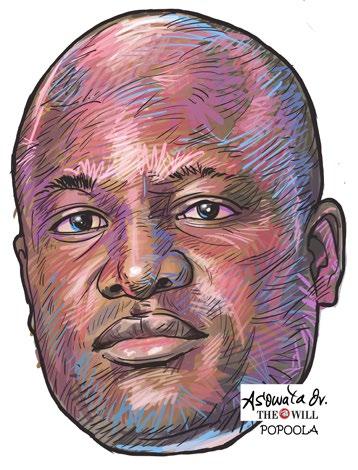
banks in Nigeria, private equity firms, investment banks and other corporate and individual shareholders.
The firm serves as the Central Depository for Equities, Commercial Papers, Corporate Bonds, Sub-National Bonds, certain Sovereign Bonds (such as the FGN Sukuk and the FGN Savings Bond), Equity-traded Funds, Real estate Investment Trusts, Mutual funds and Commodities. CSCS is licensed and regulated by the Securities and Exchange Commission (SEC).

The activities of CSCS are governed by the Investment and Securities Act 2007, the Companies and Allied Matters Act 2004, and the SEC Rules.
Leveraging digital technologies, CSCS has showcased the strong growth of the Nigerian Capital Market, enhancing investors’ confidence and offering the required channels for the management of the Nigerian equities market.
The premier capital market infrastructure, has been honoured with many awards for its outstanding contributions to the financial services industry. This includes the prestigious Capital Market Infrastructure Developer of the Year award, at the 12th Business Day Banks and other Financial Institutions (BAFI) Awards, held in October 25, 2024, in Lagos.
The BAFI Awards serve as a benchmark of excellence within Nigeria’s financial services sector, recognizing organizations, teams, and individuals who demonstrate unparalleled commitment to delivering quality financial services across diverse client segments.
“This award highlights our unwavering commitment to driving innovation and resilience in Nigeria’s capital market infrastructure. At CSCS, we believe in the power of collaboration and forward-thinking solutions to meet the evolving needs of our stakeholders and enhance the integrity of our market,” Mr Jalo-Waziri said at the award ceremony.

BY ADIJA UZODINMA
Not too long ago, many digital lending platforms in Nigeria adopted an aggressive and unethical approach to loan recovery – public shaming. Some of these apps circulated customers’ photos with humiliating messages, often sent to their contact lists. One such incident, where debtor images were widely shared online, sparked national outrage and reignited debate about ethical debt recovery practices in the digital age.
The practice became so widespread that regulators had to step in. The Federal Competition and Consumer Protection Commission (FCCPC) issued warnings and rolled out new compliance requirements. Digital lenders were compelled to register and adhere to operational guidelines. Failure to comply came with strict penalties. The Central Bank of Nigeria also weighed in, and at some point, both agencies appeared to clash over who had the constitutional authority to regulate the fintech lending space. But that’s a conversation for another day.
Back to the core issue: how do we recover loans effectively without crossing ethical lines?
This is where forward-thinking recovery firms like Mida Technologies are leading a quiet revolution. We believe that recovery can be both tech-driven and human-centred—a combination that yields better results and preserves the dignity of the borrower.
Collections don’t have to be crude to be effective. Technology gives us tools to segment debtors, track behavioural patterns, and automate respectful engagements across multiple channels—SMS, email, calls, and even WhatsApp. Using tools like digital skip tracing and repayment tokenisation, we can help lenders reach the right customers with the right message at the right time.
More importantly, we approach recovery with empathy. We understand that default doesn’t always mean unwillingness to pay. Life happens—job loss, medical emergencies, inflation, etc. Instead of harassment, we offer understanding and structured repayment plans. Instead of threats, we offer flexibility.
The results are increasingly evident. In our experience at Mida Technologies, a tech-andempathy approach can help lenders recover up to 40 percent of delinquent loans that may have otherwise been written off. That’s a significant recovery boost—one that directly improves
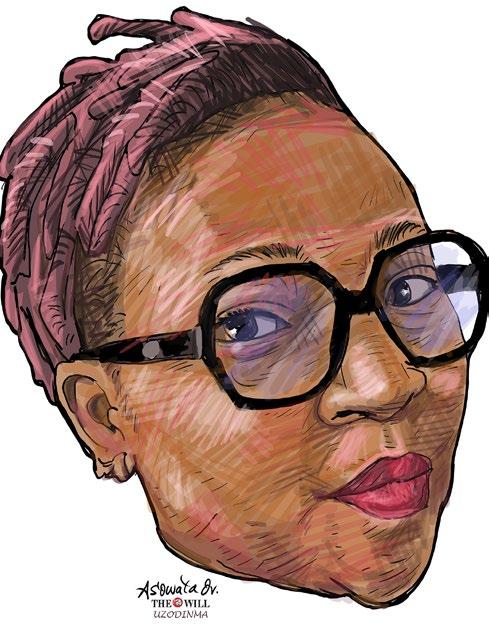
liquidity and strengthens lenders’ sustainability. When borrowers are treated with dignity, they are more likely to respond, repay, and remain in good standing. This leads to higher retention, lower customer acquisition costs and a more inclusive and resilient credit ecosystem.
It also protects the lender’s reputation. In Nigeria’s highly connected market, news of mistreatment travel fast. Ethical, technologyenabled recovery helps preserve trust while still delivering strong results.
Just as telcos outsource tower operations and logistics companies outsource delivery, lenders can (and should) outsource debt collections to specialised partners. This allows fintechs and financial institutions to focus on their core business—credit scoring, customer acquisition, product innovation—while leaving recovery to teams that are equipped with the tools, processes, and compliance frameworks to do it right.
Debt collection companies not only improve recovery rates; they also reduce internal operational costs, eliminate the need for aggressive in-house teams and help institutions stay compliant with regulatory requirements.
There is another dimension to all of this— financial inclusion. When borrowers are

When borrowers are shamed, blacklisted, or excluded from formal systems, they are pushed into informal borrowing channels, where interest rates are higher and protections are fewer
shamed, blacklisted, or excluded from formal systems, they are pushed into informal borrowing channels, where interest rates are higher and protections are fewer.
By using tech and empathy to recover loans, we keep customers within the formal system. Borrowers who repay—even after default—can rebuild their credit score, access new financial products and continue their journey towards financial empowerment.

This is the future we envision: one where recovery is not a dead end but a path back into the financial ecosystem.
Of course, there are challenges. Integrating tech tools into traditional recovery processes requires investment, training and change management. Regulatory clarity is still evolving and not all lenders are willing to shift away from the fear-based strategies of the past. But progress is being made. More lenders are starting to understand that sustainable recovery must be data-driven, respectful and compliant. And more borrowers are demanding fairness and transparency—rightfully so.
In conclusion, recovering loans through tech and empathy is not just a moral decision; it’s a strategic one. It leads to better results, happier customers, and a healthier credit market. It helps lenders recover funds and helps borrowers regain trust. In a country where access to credit is still growing, we must ensure that recovery practices evolve alongside innovation. Tech gives us the tools. Empathy gives us the lens. Together, they offer a better way forward.
•Uzodinma is the co-founder and chief operating officer of Mida Technologies

BY TITUS OLOWOKERE
In the grand tapestry of global commerce, the United States stands as a colossus — a $20 trillion marketplace of boundless opportunity, its vast consumer base an alluring siren calls to astute entrepreneurs worldwide. Yet, the spectre of Trump-era trade tariffs, recently unfurled with a hypothetical 14 per cent levy on Nigerian exports, casts a shadow over this gilded prospect.
For Nigeria’s indefatigable business luminaries, however, such barriers are not insurmountable walls, but mere hurdles to be vaulted with ingenuity and strategic acumen. Nigeria’s business leaders can thrive by targeting high-potential sectors, capitalising on niche markets and harnessing e-commerce, all while riding the wave of US demand for Africansourced goods. Backed by specific examples and data, this article charts how Nigerian enterprises can adapt to tariffs, mitigate their impact and seize the American prize through strategic partnerships and trade agreements.
Agriculture offers a fertile starting point. Nigeria, Africa’s top cocoa producer, exported $300 million worth in 2023, much of it destined for the US’ $20 billion confectionery market. Tariffs threaten margins, but the African Growth and Opportunity Act (AGOA) provides duty-free access for over 6,800 products, including cocoa.
Nigerian exporters can target niche US segments — like the $1.5 billion organic chocolate sector — where premium pricing offsets added costs. Take Chocolala, a US artisanal brand: it seeks 200 metric tons of Nigerian cocoa annually at $1.2 million, favouring sustainable sources. Processing cocoa into powder locally slashes tariffed volumes by 30 per cent, per industry estimates, aligning with American tastes for ready-to-use goods.

Fashion, too, presents a vibrant frontier. Nigeria’s textile industry, bolstered by designers like Deola Sagoe, taps into the US’ $400 billion apparel market, where African-inspired fashion is surging — Ankara print sales on Etsy rose 25 per cent in 2024.
Tariffs could dampen exports, but e-commerce offers a nimble workaround. Platforms like Amazon and Shopify enable Nigerian SMEs to sell directly to US consumers, with small-batch shipping dodging bulk import duties. A practical example: Lagos-based Adire Textiles secured a $500,000 deal with a US retailer via Etsy in 2023, absorbing tariffs through premium pricing.
Forming trade partnerships with American brands further cushions costs; a co-branded line with a US fashion house can share tariff burdens while expanding reach.
Technology, Nigeria’s rising star, sidesteps tariffs entirely. The US tech sector, valued at $1.8 trillion, craves innovative solutions; Nigerian fintech exports grew 40 per cent to $150 million in 2024, according
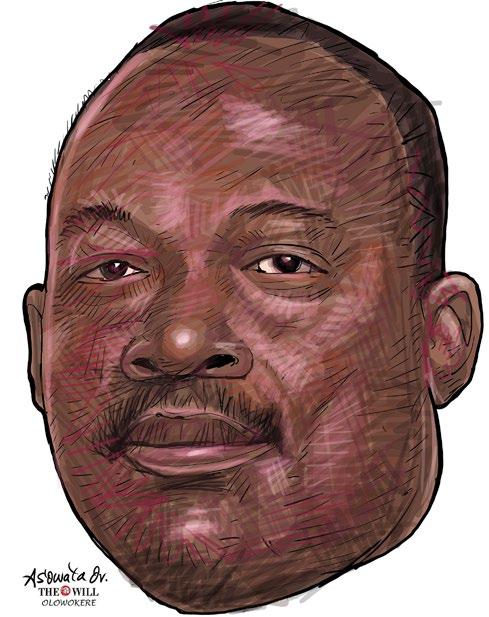
to Central Bank data. Unlike goods, digital exports face no duties, making firms like Paystack prime contenders.
A US startup recently posted a $1 million contract for Nigerian developers to build a logistics app, reflecting demand for cost-effective tech post-tariffs. Partnerships with American firms amplify this edge; Flutterwave’s 2023 tie-up with a US payment processor yielded $5 million in joint revenue, showcasing the power of collaboration in a tariff-free domain.
The US’ growing demand for African-sourced products fuels additional prospects. Nigeria’s cashew exports, at $250 million in 2023, align with the $135 billion US snack food market, where plant-based trends dominate. Cashew consumption rose 15 per cent last year, according to USDA figures.
Tariffs bite, but roasting cashews locally cuts export weight by 20 per cent, thereby reducing costs. A US distributor, Nutty Co., seeks 150 tons of roasted Nigerian cashews for $800,000, favouring preprocessed goods.
Cultural products also shine; the $50 billion US craft market saw Nigerian beadwork sales jump 30 per cent on Amazon in 2024. Diaspora networks amplify this: Atlanta’s Nigerian community drove $1 million in craft sales last year, a tariff-light channel via direct trade.
To mitigate tariff impacts and unlock this $20 trillion market, Nigerian businesses can deploy three strategies. First, trade partnerships with US entities distribute costs and open doors. A US cocoa buyer co-
Streamlining export procedures, enhancing quality control mechanisms, and promoting investor confidence domestically will fortify Nigeria’s standing as a formidable player in global trade
investing in a $2 million Nigerian processing plant, for instance, offsets tariffs while scaling supply.
Second, leveraging AGOA and the African Continental Free Trade Area (AfCFTA) ensures competitive access; AGOA saved Nigerian exporters $50 million in duties in 2023, according to NEPC data. Third, e-commerce slashes barriers: Nigeria’s online exports via Amazon hit $10 million last year, proving its potency for SMEs.
Policymakers, too, bear a pivotal role in facilitating this transformation. Streamlining export procedures, enhancing quality control mechanisms, and promoting investor confidence domestically will fortify Nigeria’s standing as a formidable player in global trade.
Entrepreneurs should pursue transatlantic alliances and tech-driven sales, turning tariffs into a spur for innovation. The US market, with its $10 billion annual trade with Nigeria, is no mirage but a prize within reach.
As the world recalibrates post-pandemic and post-protectionism, the time is ripe for Nigerian businesses to assert their presence on the global stage. The $20 trillion prize awaits — not merely as a destination but as a testament to what can be achieved when innovation meets determination.
With partnerships and trade agreements, Nigerian entrepreneurs can transform challenges into triumphs, securing their foothold in the $20 trillion US economy. The time to act is now — beyond tariffs lies a wealth of possibility. Beyond tariffs lies opportunity; beyond uncertainty lies prosperity. For those bold enough to seize it, the future is undeniably bright.
•Olowokere is the executive director/CEO of the US-Nigeria Business Council, Atlanta, GA.
Photo Editor: Peace Udugba [08033050729]

L-R: Head of Aurora Tech Award, inDrive, Isabella Ghassemi-Smith; winner, Aurora Tech Award 2025 and founder, Hervest Fintech, Solape Akinpelu, and Senior Director of Operations Excellence and Sustainability, inDrive, Asya Vildt, during the presentation of the $30,000 grand prize to the winner at the grand finale event held in Cairo, Egypt recently.

Director, Habila
of the
and
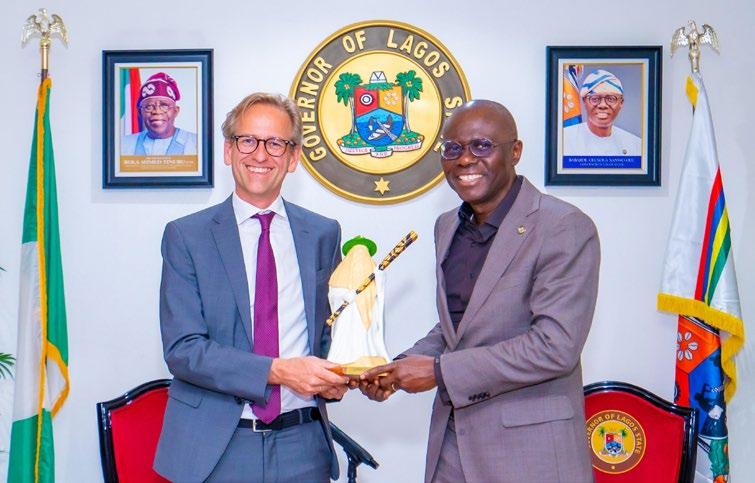
Ambassador of Denmark to Nigeria, Mr. Jens Ole Bach Hansen receiving an Eyo Plaque from the Governor of Lagos State, Mr. Babajide Sanwo-Olu, during a courtesy visit at the Lagos House, Marina on April 16, 2025.
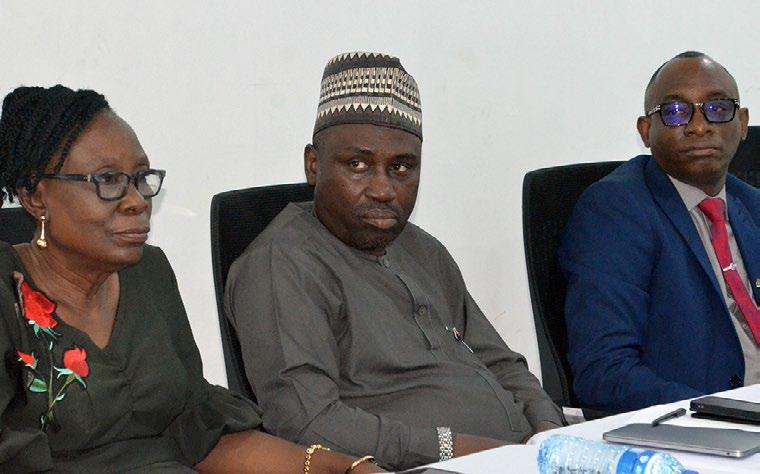
L-R: Representative of the Director-General, Bureau of Public Service Reforms (BPSR), Ms Atinuke Ajiboye; representative of the Minister of Information and National Orientation, Dr. Sulieman Haruna and the Director-General of BPP, Dr. Adebowole Adedokun, during the BPP’s 1-day National Stakeholders Interactive Workshop with CSOs in Nigeria on the current trend in procurement practices and their role in procurement processes in Abuja on April 14, 2025.
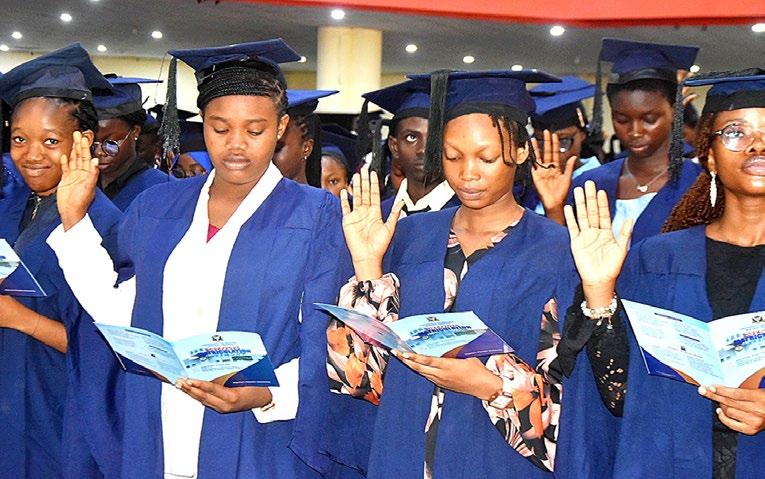
Matriculating students, Seun Folahan;
their
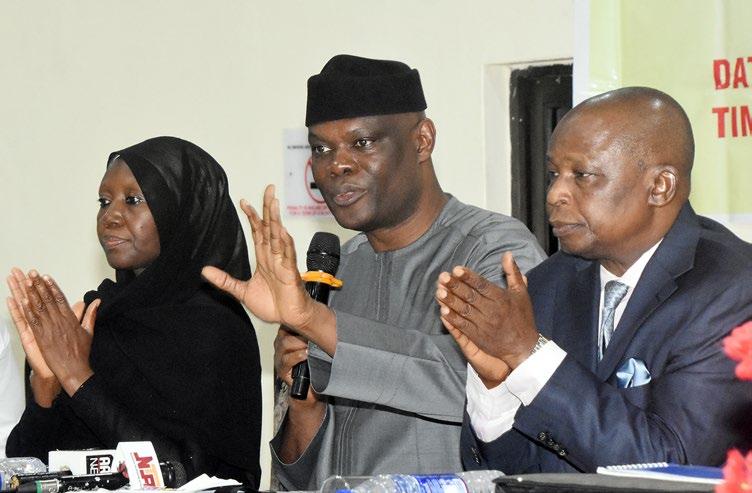





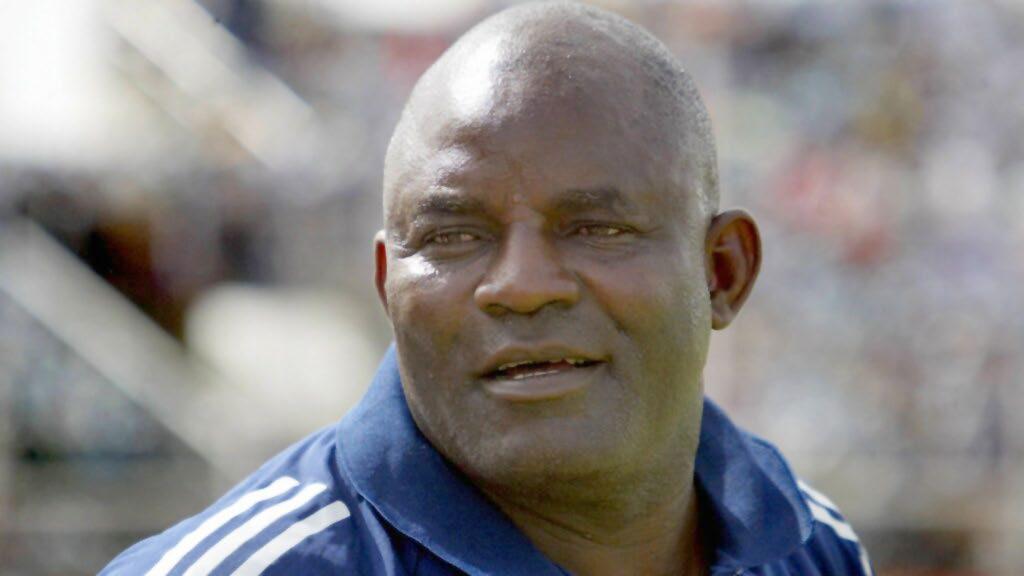
BY JUDE OBAFEMI
On April 12, 2025, Nigeria lost two of its football legends, Christian Chukwu and Charles Bassey. Both of them were integral members of the 1980 Africa Cup of Nations-winning Green Eagles.
Chukwu, aged 74, captained the team to Nigeria’s first continental title, while Bassey, aged 71, contributed as a dynamic forward. Their deaths, occurring within hours of each other, plunged the nation into mourning, prompting tributes that celebrated their contributions while exposing the systemic neglect that marred their later years.
Christian Chukwu, born on January 4, 1951, in Enugu, was a towering figure in Nigerian football. Known as “Chairman” for his leadership, he captained the Green Eagles to a historic 3-0 victory over Algeria in the 1980 AFCON final at the National Stadium, Surulere. His commanding presence as a defender earned him the tournament’s best player award.
Chukwu’s career began with Enugu Rangers, where he played his entire club career, leading the team to multiple league titles and the 1977 African Cup Winners’ Cup, a landmark achievement for Nigerian clubs. He earned 54 caps for Nigeria between 1974 and 1981, scoring five goals,
In their memory, Nigeria should commit to change “

and competed in the 1976 and 1978 AFCON tournaments, securing bronze medals.
After retiring, Chukwu coached Enugu Rangers, the Kenyan national team and the Super Eagles from 2003 to 2005, guiding Nigeria to a third-place finish at the 2004 AFCON in Tunisia. His teammate, Segun Odegbami described him as one of Nigeria’s greatest footballers, a sentiment echoed by Victor Ikpeba, who noted Chukwu’s mentorship of younger players into the 2000s.
Charles Bassey, born in Eket, Akwa Ibom, was a key forward in the 1980 AFCON squad. His flair and goal-scoring ability complemented Chukwu’s defensive solidity, contributing to the Green Eagles’ triumph. Bassey played for Calabar Rovers and later coached several Nigerian clubs, including Akwa United, Wikki Tourists, BCC Lions, Flash Flamingoes and Mobil Pegasus. His post-playing career focused on mentoring young talent, leaving a lasting impact on domestic football. However, Bassey’s later years were marked by health struggles stemming from a 1986 car accident, which caused nerve root compression in his spinal cord. Despite surgery in 2021, funded by the Femi Otedola Foundation, his prolonged illness culminated in his death on April 12. The NFF described his passing, alongside Chukwu’s, as a “double tragedy,” noting that nine members of the 22-man 1980 squad have now died, including goalkeepers Best Ogedegbe and Moses Effiong, defenders Okechukwu Isima and Tunde Bamidele, midfielders Aloysius Atuegbu and Mudashiru Lawal, as well as forward Martins Eyo.


The outpouring of grief in tributes drawn from across Nigeria’s football community underscores the personal and professional impact of both men. Yet, their deaths also cast a harsh light on Nigeria’s treatment of its sporting heroes. Chukwu’s financial and health struggles were welldocumented. In 2019, he faced prostate cancer, with mobility issues that required treatment abroad. Philanthropist Femi Otedola and the Enugu State Government funded his surgery, but the NFF’s contribution was limited, despite public appeals.
More damningly, Chukwu claimed in a 2024 interview with The Athletic NG that the NFF owed him over N200 million in unpaid salaries and allowances from his 2003-2005 coaching tenure, a debt he said extended to other indigenous coaches. He contrasted this with his experiences coaching in Kenya and Lebanon, where payments were prompt, stating, “What can I do? There is nothing I can do; the file is there, and they have the file.” His son, Christian Chukwu Jr, confirmed the family’s intent to petition the NFF for these dues, highlighting the financial strain Chukwu endured despite his children’s efforts to support him.
The NFF, however, denied owing Chukwu, with General Secretary, Mohammed Sanusi claiming recently that a committee under former president Amaju Pinnick had cleared all debts to coaches. Sanusi challenged anyone to provide proof of outstanding payments, a stance that conflicts with Chukwu’s own words and reports from sources like the BBC, which in 2008 alleged the NFF owed him $128,000 (approximately N205 million in 2025). This discrepancy fuels perceptions of bureaucratic neglect, with Chukwu’s teammate, Adokiye Amiesimaka, accusing the NFF of hypocrisy in mourning legends they failed to support.
Bassey’s health struggles further exposed the absence of a robust healthcare system for retired athletes. His 1986 accident led to decades of mobility issues, exacerbated by inadequate funds for treatment until Otedola’s intervention in 2021. The lack of a structured welfare programme for former players stands in stark contrast to systems in countries like England, where the Professional Footballers’ Association provides medical and financial support for retirees.
Nigeria’s failure to implement similar measures has left many 1980 AFCON heroes, now mostly in their 70s, vulnerable to poverty and illness. Chukwu Jr noted that the government should have a programme to provide healthcare and allowances for these veterans, echoing former governor Jim Nwobodo’s call for better treatment of Nigeria’s sporting pioneers.
The deaths of Chukwu and Bassey have sparked broader conversations about honouring Nigeria’s football legends.


ogannah@thewillnews.com
stands at a dangerous precipice, with blood spilling across its landscape in a pattern too familiar to be coincidental. The past week has seen violence erupt in multiple regions: in Plateau State, at least 40 people were massacred during a midnight raid on the remote Zike community; in Borno State, a deadly bomb blast on the Damboa-Maiduguri highway claimed eight lives; and in Bayelsa, pipeline sabotage threatened critical energy infrastructure. These tragedies, occurring within days of each other, paint a grim portrait of a nation struggling against forces that seek to destabilise it from within.
The timing of this violence reveals a disturbing calculation. President Bola Tinubu was in France on what the presidency described as a working visit as these attacks ramp up. While statements from Aso Rock insist that he remains engaged, condemning the killings and ordering humanitarian interventions, his physical absence has fuelled public perception of absentee leadership. Social media has become a cauldron of grief and outrage, with citizens expressing a sense of abandonment when they most need reassurance.
I do not believe that these heinous incidents are merely coincidental. There is a recognisable pattern to how insecurity, particularly in Nigeria’s North, escalates at strategic moments when political control is being contested or when certain entrenched interests feel marginalised. Former Vice President Atiku Abubakar’s characterisation of Tinubu’s absence as “worrisome absenteeism” and Peter Obi’s condemnation of the lack of immediate national leadership speak to a larger narrative being constructed: that of a president unable to maintain control.
The parallels with former President Goodluck Jonathan’s experience are striking. During his presidency, a similar narrative of incapacity in the face of spiralling insecurity was deployed by his critics, many of whom now surround Tinubu. The northern insurgency that painted Jonathan’s government as adrift ultimately contributed to his becoming the first incumbent president in Nigeria’s history to lose a re-election bid. The architects of that political strategy appear to be working from the same playbook against a new target. I am not being paranoid. Any smart data analyst should easily recognise this pattern. Terrorist attacks, banditry and orchestrated violence often flare not merely as criminal acts but as instruments of political communication, deliberate signals meant to unsettle a government perceived as unwilling to serve certain interests. The deaths of innocents become collateral in a theatrical performance designed to sow discontent, tarnish the government’s image, and erode the incumbent’s popular support.
Such strategies are not unique to Nigeria. During the “Troubles”, the Irish Republican Army targeted not just infrastructure but public confidence in the British Government’s ability to effectively govern Northern Ireland. From Colombia to Pakistan, examples abound of how extremist violence often aligns with elite political manoeuvring. The tragedy lies not just in the violence itself but in the cynical calculation that makes such violence an acceptable cost for political advancement.
The most chilling aspect of this approach is its fundamental disregard for human life. When women, children and entire
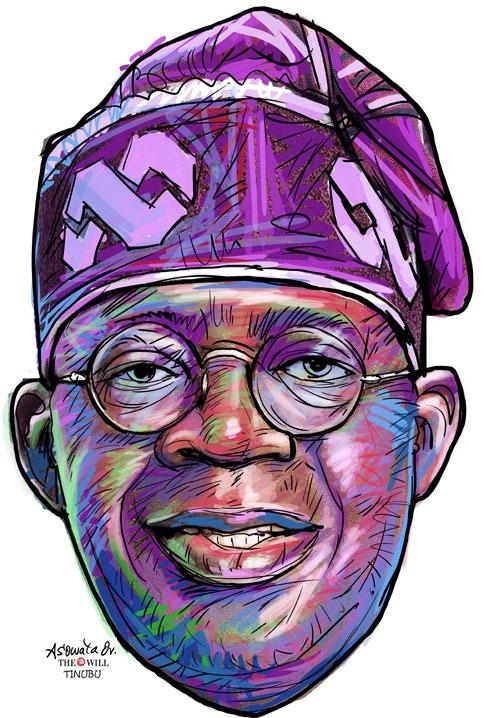
communities are reduced to pawns in a grotesque game of political brinkmanship, the soul of the nation is mortgaged. Bodies are buried so that political ambitions may rise, a playbook with no shame, no honour, and no boundaries. It is not the frequency or brutality of these events alone that frightens Nigerians, but the realisation that their lives may be expendable in service to someone else’s quest for power.
Unlike conflicts driven by coherent ideological causes, the randomness and intensity of Nigeria’s violence stands as a blunt-force message: “The government is weak; the President is vulnerable; the time for change is near.” This message is not crafted for ordinary Nigerians but for consumption by kingmakers, cabals and foreign observers. For the victims, there is only silence, trauma and the ruins of what was once home.
Nigeria’s security response remains inadequate to this challenge. Agencies are underfunded, under-equipped, and often compromised. Even the military—once the nation’s proudest institution—struggles to hold territory. Reactions to attacks are delayed and reactive rather than preventive. The presidency’s attempts to manage public perception through press statements and vague reassurances fail to address the fundamental security
crisis facing the nation.
The deeper roots of this crisis lie in Nigeria’s political culture, particularly in the failure of democratic structures. If the Independent National Electoral Commission (INEC) were beyond reproach, if elections genuinely reflected the will of the people rather than the machinations of the powerful, perhaps politicians would have fewer incentives to turn to insecurity as a tool of political messaging.
This is why Nigeria’s political crisis is not just about who holds power but how that power is attained and preserved. In the absence of guaranteed electoral integrity, elections become contests not of ideas but of manipulation, muscle, and manufactured insecurity. If citizens believed they could remove underperforming leaders with their votes and replace them with genuine alternatives, then those in power would be more accountable, and those seeking power would be more honourable in their methods.
Without trusted democratic processes, violence remains the loudest voice in the room and this is indeed very disturbing as well as saddening. Political discourse is determined not by debate but by blood, with regional instability serving as a form of communication more effective than any campaign speech. The cynical use of violence as a political tool becomes viable precisely because legitimate democratic channels have been corrupted or rendered ineffective.
For President Tinubu, the challenge is twofold. First, he must respond decisively to violence, not just with military force but with political clarity. Second, he must protect the democratic infrastructure that allows for peaceful political change. This means strengthening electoral processes, ensuring judicial independence, and fostering political dialogue that does not resort to subterfuge or violence.
Real leadership does not run when there is fire. It does not remain silent when its people cry out. And it certainly does not allow blood to stain the path to political ambition. Nigeria cannot continue in this cycle where lives are exchanged for political expediency and governance is reduced to a theatre of survival. Nigeria’s security must be overhauled, but so too must the nation’s electoral architecture.
If electoral legitimacy were guaranteed, then elected leaders would know they must serve or be replaced—not by force, not by subterfuge, but by the ballot. Opposition forces would focus not on destabilisation but on persuasion. Until then, politics will remain a dangerous game in which the stakes are paid in blood.
Nigeria grieves today, but it must not be allowed to grieve in vain. From these acts of violence must rise a renewed commitment to democratic principles, secure communities, and leadership that values human life above political advantage. The future of the nation depends not just on stopping the immediate violence but on addressing the deeper dysfunction that makes such violence politically expedient. Only then can Nigeria truly emerge from this deadly crossroads and chart a path toward lasting peace and genuine democracy.
If citizens believed they could remove underperforming leaders with their votes and replace them with genuine alternatives, then those in power would be more accountable and those seeking power would be more honourable in their methods